#might be a game that's not known outside of germany but I have literally no way of knowing that. maybe a very very unknown game in general
Text
randomly remembered a game i used to play as a kid but I can't remember what it's called and can't find it online 😭
it was for pc and you played as some kind of humanoid animal? a dog maybe? i don't remember much about it but at one point in the game you had to write something in the sky in morse code with a flashlight...
I used to borrow it from our local library but we absolutely don't have it anymore bc we don't have any videogames at all anymore & we delete things we don't have anymore from our system so I can't look it up there :'(
#i through it multiple times so it must have been fun#I also played a Fix und Foxi game a lot and a Der kleine Eisbär one <3#unfortunately the one I'm looking for wasn't from a known brand like those ones so I don't remember the naaameeee 😭#doddie redet#might be a game that's not known outside of germany but I have literally no way of knowing that. maybe a very very unknown game in general#but I hope not! might ask my mom tomorrow tho if I remember she might know it
9 notes
·
View notes
Note
Hey zoomer Huey, oh my god ac red is going to be HELL when they finally revealed Yasuke is going to be the second playable character
https://x.com/oliverjia1014/status/1768104847071719880?s=46
My thing with Yasuke for the upcoming game that they acknowledge he a OUTSIDER. Hell I did some dna research in Southeast Asia and it stated many communities are East African descent so they can say post main story Yasuke settled down and retired to one of those places
Also I saw people said Japan achieved more than those 54 countries….sigh….
People forget that modern Japan is HEAVILY westernized due to American military there (mainly because we don’t want more batshit crazy soldiers like imperial Japanese ones)
And we took care of most of military might because we all know how fucked Japan would be after China got it shit together right?
So Japan was able to rebuilt faster than most countries
We just didn’t pull a British Raj and let Japan keep most of their culture. Okay okay it more complicated
Not to mention our knowledge of japan is due to american occupation there thus the culture exchange for 80 years.
Like my Yoruba thing, yes I want to show more Africans stories. But I swallow the hard pill that I can set the foundation for more better and accurate African stories. But will die before seeing African warriors be treated the same way as Samurai warriors
Also the inferiority complex, look yes African cultures are still shit on
But just grow the fuck up and stop acting like Twitter discourse is everything
I mean I recently bought the Ramayana after finding a mutual who like a naughty character Twitter see as the devil.
Just saying there are good African AND African Americans stories we can tell.
Actually have fleshing out the chimera republic in mind. I think I started to realize an issues with the knights and samurai shit. Wanna read in an another anon?

Did a reverse search on the image here, nice to see most everyone is on the same page, which is Yasuke was real and the only black samurai that's known
Fellow from Japan suggested checking this site if you're looking for dark skinned people, not sure if he means African or not, Spain and Portugal did lots of trading might have had some African slaves or something like that with them. I dunno.
My thing with Yasuke for the upcoming game that they acknowledge he a OUTSIDER. Hell I did some dna research in Southeast Asia and it stated many communities are East African descent so they can say post main story Yasuke settled down and retired to one of those places

I can believe the East African bit, these are the "bad guys" from 300 from India to Ethiopia and they were big on moving people from one place to another in order to keep them from creating a large enough community to pose a threat.
They've become pretty westernized over there in Japan ya, not all the way the commercial with the company apologizing for raising the price of a ice cream after like 25 years is not a western thing at all, we'd say fuck you and then increase it again.
Arizona Ice Tea is a outlier there.
And we took care of most of military might because we all know how fucked Japan would be after China got it shit together right?
We took care of military for the same reason we did with Germany, don't want to have to deal with that shit again so you can have a very limited military that's geared for self defense, someone attacks we'll come running and cover you.
Like my Yoruba thing, yes I want to show more Africans stories. But I swallow the hard pill that I can set the foundation for more better and accurate African stories. But will die before seeing African warriors be treated the same way as Samurai warriors
See if you can find the Shaka Zulu series they made, man literally changed warfare in that part of Africa.
Big issue with sub Saharan Africa is I don't think there was any groups that could field a 10,000 man army, not many at least, not till after islam showed up and gave a unifying identity to different groups. This is just from what I know I may be wrong though.
Just saying there are good African AND African Americans stories we can tell.
Actually have fleshing out the chimera republic in mind. I think I started to realize an issues with the knights and samurai shit. Wanna read in an another anon?
True dat, and ya that could be a fun read feel free.
7 notes
·
View notes
Note
Shadow of Shinra AU
_Apparently Weiss and Nero were chained the whole time before DoC or before killing Restrictor,even after they retrieved Genesis too, apparently they're bound until they overthrew their previous boss/owner,if they got freedom,it was limited and off to your restraining prison you go. So in this incorrect quotes, they're bound the whole time
Darling: You guys honestly don't know about video games?
Nero, Weiss: Nope
Darling: Even though you have a boss like the Restrictor?
Restrictor: What is that supposed to mean?
Darling: Oh please anyone with a basic knowledge of video games would know you look like a typical evil,asshole-looking villain boss!!
Darling: Btw bois,a game boss is technically a game character
Nero, Weiss: Well that's interesting. He is exactly like you described about the game character
Restrictor: 😠 I'M NOT SOME FUCKING FICTIONAL CREATURE!!!!!!
Subtle Fourth Wall breaking right?
---------------------------
Darling:*holding a book she was reading to them* Do you guys know that "Nero" and "Weiss" mean Black and White in two different languages?
Nero,Weiss: 😲😯!!!!!!!
Nero, Weiss: 🥺🥺💘
Nero and Weiss might or might not have thought she was being motherly and she was acting like a mother figure,no ofc not
Also I'm not sure Germany or Italy even exist in Gaia or Gaia has its own equivalents of Germany and Italy. I decided to just put it as different languages
---------------------------
Restrictor: You CRITICIZED my looks but not Nero who literally looks like a BDSM spider?
Darling:*gasp* TAKE THAT BACK YOU BITCH,HE LOOKS FINE, HE'S JUST A LIL FREAKY!!!!!
Restrictor: Okay so I'm the bitch now??!!! 😠
Nero: I know what a spider is, that's how I have this look. But what is BDSM?
Darling: This is hard to say,dear. But I think you deserve to know
*After Nero found out what is BDSM*
Nero:"........."
Nero: Wow a BDSM spider? Really?
Nero: You look even more monstrous than I am, I mean is that a helmet you're wearing or your actual head? Are those your actual limbs? Do you even have flesh?
Restrictor: BITCH YOU DID NOT-
Weiss: This is fun ಠ‿ಠ. Haven't had this much fun in a long while now
Restrictor was an asshole boss
-🌹
LMAO
I mean, Restrictor deserves kudos for awakening one of the greatest shit talkers known to Gaia. Holy shit, did Nero go hard.
But yikes, the bit about them always being restrained is extremely tragic. It's no wonder why Nero and Weiss are psychopathic. Shinra just love producing "monsters" that not only hate almost everything but them too, right?
But it makes the bits where the darling teaching them about the outside world more endearing in a way, even though she is just manipulating them...
4 notes
·
View notes
Text
“…Many parents of all classes sent their children away from home to work as servants or apprentices - only a small minority went into the church or to university. They were not quite so young as the Venetian author suggests, though. According to Barbara Hanawalt at Ohio State University, the aristocracy did occasionally dispatch their offspring at the age of seven, but most parents waved goodbye to them at about 14. Model letters and diaries in medieval schoolbooks indicate that leaving home was traumatic. "For all that was to me a pleasure when I was a child, from three years old to 10… while I was under my father and mother's keeping, be turned now to torments and pain," complains one boy in a letter given to pupils to translate into Latin. Illiterate servants had no means of communicating with their parents, and the difficulties of travel meant that even if children were only sent 20 miles (32 km) away they could feel completely isolated.
So why did this seemingly cruel system evolve? For the poor, there was an obvious financial incentive to rid the household of a mouth to feed. But parents did believe they were helping their children by sending them away, and the better off would save up to buy an apprenticeship. These typically lasted seven years, but they could go on for a decade. The longer the term, the cheaper it was - a sign that the Venetian visitor was correct to conclude that adolescents were a useful source of cheap labour for their masters. In 1350, the Black Death had reduced Europe's population by roughly half, so hired labour was expensive. The drop in the population, on the other hand, meant that food was cheap - so live-in labour made sense.
"There was a sense that your parents can teach you certain things, but you can learn other things and different things and more things if you get experience of being trained by someone else," says Jeremy Goldberg from the University of York. Perhaps it was also a way for parents to get rid of unruly teenagers. According to social historian Shulamith Shahar, it was thought easier for strangers to raise children - a belief that had some currency even in parts of Italy. The 14th Century Florentine merchant Paolo of Certaldo advised: "If you have a son who does nothing good… deliver him at once into the hands of a merchant who will send him to another country. Or send him yourself to one of your close friends... Nothing else can be done. While he remains with you, he will not mend his ways."
Many adolescents were contractually obliged to behave. In 1396, a contract between a young apprentice named Thomas and a Northampton brazier called John Hyndlee was witnessed by the mayor. Hyndlee took on the formal role of guardian and promised to give Thomas food, teach him his craft and not punish him too severely for mistakes. For his part, Thomas promised not to leave without permission, steal, gamble, visit prostitutes or marry. If he broke the contract, the term of his apprenticeship would be doubled to 14 years. A decade of celibacy was too much for many young men, and apprentices got a reputation for frequenting taverns and indulging in licentious behaviour. Perkyn, the protagonist of Chaucer's Cook's Tale, is an apprentice who is cast out after stealing from his master - he moves in with his friend and a prostitute. In 1517, the Mercers' guild complained that many of their apprentices "have greatly mysordered theymself", spending their masters' money on "harlotes… dyce, cardes and other unthrifty games".
In parts of Germany, Switzerland and Scandinavia, a level of sexual contact between men and women in their late teens and early twenties was sanctioned. Although these traditions - known as "bundling" and "night courting" - were only described in the 19th Century, historians believe they date back to the Middle Ages. "The girl stays at home and a male of her age comes and meets her," says Colin Heywood from the University of Nottingham. "He's allowed to stay the night with her. He can even get into bed with her. But neither of them are allowed to take their clothes off - they're not allowed to do much beyond a bit of petting." Variants on the tradition required men to sleep on top of the bed coverings or the other side of a wooden board that was placed down the centre of the bed to separate the youngsters. It was not expected that this would necessarily lead to betrothal or marriage.
To some extent, young people policed their own sexuality. "If a girl gets a reputation of being rather too easy, then she will find something unpleasant left outside her house so that the whole village knows that she has a bad reputation," says Heywood. Young people also expressed their opinion of the moral conduct of elders, in traditions known as charivari or "rough music". If they disapproved of a marriage - perhaps because the husband beat his wife or was hen-pecked, or there was a big disparity in ages - the couple would be publicly shamed. A gang would parade around carrying effigies of their victims, banging pots and pans, blowing trumpets and possibly pulling the fur of cats to make them shriek (the German word is Katzenmusik). In France, Germany and Switzerland young people banded together in abbayes de jeunesse - "abbeys of misrule" - electing a "King of Youth" each year. "They came to the fore at a time like carnival, when the whole world was turned upside down," says Heywood. Unsurprisingly, things sometimes got out of hand. Philippe Aries describes how in Avignon the young people literally held the town to ransom on carnival day, since they "had the privilege of thrashing Jews and whores unless a ransom was paid".
In London, the different guilds divided into tribes and engaged in violent disputes. In 1339, fishmongers were involved in a series of major street battles with goldsmiths. But ironically, the apprentices with the worst reputation for violence belonged to the legal profession. These boys of the Bench had independent means and did not live under the watch of their masters. In the 15th and 16th Centuries, apprentice riots in London became more common, with the mob targeting foreigners including the Flemish and Lombards. On May Day in 1517, the call to riot was shouted out - "Prentices and clubs!" - and a night of looting and violence followed that shocked Tudor England. By this time, the city was swelling with apprentices, and the adult population was finding them more difficult to control, says Barbara Hanawalt. As early death from infectious disease became rarer the apprentices faced a long wait to take over from their masters. "You've got quite a number of young men who are in apprenticeships who have got no hope of getting a workshop and a business of their own," says Jeremy Goldberg. "You've got numbers of somewhat disillusioned and disenfranchised young men, who may be predisposed to challenging authority, because they have nothing invested in it."
How different were the young men and women of the Middle Ages from today's adolescents? It's hard to judge from the available information, says Goldberg. But many parents of 21st Century teenagers will nod their heads in recognition at St Bede's Eighth Century youths, who were "lean (even though they eat heartily), swift-footed, bold, irritable and active". They might also shed a tear over a rare collection of letters from the 16th Century, written by members of the Behaim family of Nuremberg and documented by Stephen Ozment. Michael Behaim was apprenticed to a merchant in Milan at the age of 12. In the 1520s, he wrote to his mother complaining that he wasn't being taught anything about trade or markets but was being made to sweep the floor. Perhaps more troubling for his parents, he also wrote about his fears of catching the plague. Another Behaim boy towards the end of the 16th Century wrote to his parents from school. Fourteen-year-old Friedrich moaned about the food, asked for goods to be sent to keep up appearances with his peers, and wondered who would do his laundry. His mother sent three shirts in a sack, with the warning that "they may still be a bit damp so you should hang them over a window for a while". Full of good advice, like mothers today, she added: "Use the sack for your dirty washing."
- William Kremer, “What medieval Europe did with its teenagers.”
41 notes
·
View notes
Photo
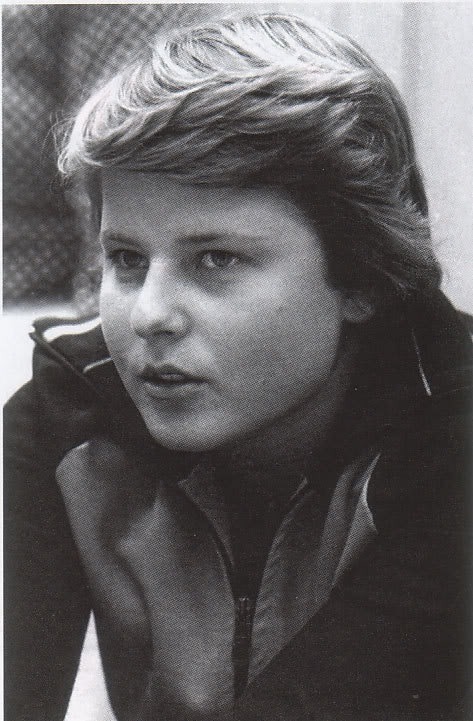

Andrea Bieger and the Mysteries of the Dumpster Fire History
The Beijing Olympic Quad was the beginning of the height of Marta Karolyi’s power over elite gymnastics in the United States. The US had won it’s first team world championship gold at home in 2003, and the first Olympic all around champion at a non boycotted Olympic Games in 2004.
Marta Karolyi’s whims could put you on teams or leave you off. At the 2006 World Championships two US gymnasts Natasha Kelley and Ashley Priess “disappointed” in qualification and they weren’t just not used in the team finals but their names weren’t even listed on the forms for the team final. Erased from existence. A move that should have gotten Marta fired because if you don’t list an athlete on the forms you can’t use them and if there had been an injury (as there was) in that team final the US couldn’t have used either young woman as an reserve athlete. Nastia Liukin, who could barely walk at the time was put down as a reserve for vault, beam, and floor when all she could perform was bars. When the 2005 world all around champion Chellsie Memmel had a shoulder injury during her bars routine there was no other choice but to have her continue on to perform beam and floor. There was literally no other option.
Despite the fact that Marta being a vindictive woman nearly losing the US a medal there were no consequences for that incident.
The top US athlete at the 2006 worlds was Jana Bieger who won the silver medal in the all around behind legend Vanessa Ferrari. She wasn’t flashy like Nastia Liukin or the all american kid like Shawn Johnson. In fact she was, as NBC liked to remind people, born in Germany. Her mother, Andrea Bieger was a 1976 Olympian for West Germany. She finished 12th in the Montreal AA as the top non eastern bloc gymnast. She was the West German national champion and almost certainly would have gone to the 1980 Olympics were it not for the boycott. In Germany she trained as a sports medicine doctor and physical therapist before immigrating to the United States in 1996 with her two children.
Jana was coached by her mother (the 2008 quad had an absurd amount of top gymnasts coached by their parents including 4 on the US team alone and something like 8 total among the top of the sport at the time).
Larry Nassar was known to have been less active during this period of time than before or after. There has been a lot of speculation as to why. His own child was young at the time and maybe he wasn’t around as much. I’ve seen a lot of speculation that he was scared of Valeri Liukin who was coaching his daughter Nastia as the formidable Soviet coach. Another member of the Beijing olympic team was the daughter of a senior USAG official and that might have scared him. Or it might be the actual sports medicine doctor who was attending national team camps. Or a combination of the above.
But after an injury in early 2007 Jana Bieger was on the outside looking in at the Olympic hopefuls. She ended up as an alternate. But watching 2008 US Nationals I’ve never felt so much like there was an external finger on the scale of the judging as at this competition. The biggest names and favorites were given unexplainable gifts. She was being judged perhaps not harshly outside of this context but not to the same standard as her competitors. Like the judges had been told to low ball her by Marta.
And I can’t help but wonder if Dr. Andrea Bieger was a threat to Marta Karolyi who wouldn’t have been able to bully or bullshit her the way she had so many others.
3 notes
·
View notes
Text
Each year we take a close look at the prompts for Sledgefu Week, for those who may be stuck for ideas or not quite sure about what the prompts could entail. Below the readmore are all seven prompts, as well as a short write-up exploring what they mean and some ideas to help get the creative juices going. Enjoy!!
Sickfic
This is a really popular and well-known fanfic trope that I feel probably needs little explanation, but I’ll write a little bit about it anyway! It essentially covers fic where one character is ill and the other cares for them -- it could encompass any kind of illness at all, (including chronic illnesses) and there’s a lot of room to get creative with it. You can go for angst, hurt/comfort, or fluff: it’s just a really good general prompt that I think works nicely to kick the week off!
It suits for Sledgefu pretty well, considering Snafu’s canon mild hypochondria, as well as the fact that Eugene’s dad is a doctor. It could be fun to lean into it: make Eugene play doctor for an actually-sick Snafu, and it could be just as fun to subvert it! There’s really endless options for canon fic: shrapnel wounds turned bad, heat-sickness, seasickness, illness from bad food or bad water or any kind of tropical disease you can think of (malaria is a big one!). You could make one of them (or both) a medic; you could genderswap them and write the gay field nurse fic this fandom sorely needs. And of course if you choose to branch out into modern AU you can begin to think of what might afflict them outside of a war setting: has Eugene been working too much and come down with a cold? Are they hungover, and need mutual care (and lots of takeout)? A lot of the time sickfic focuses on one character doing the comforting and the other character feeling unwell, but there’s nothing to say they can’t both be feeling shitty! I think we say this every year but there’s really no rules at all, you do whatever you feel inspired to do. With Sickfic, just be mindful to tag anything that others might be affected by eg. vomiting, blood, needles, etc.
Tarot
I feel like Tarot is pretty well-known to the Sledgefu fandom, or at least to those who like to write Snafu or his family a little witchy. In case you just have a vague idea of what Tarot actually is and what its purpose or origins are, I’ll explain it as concisely as I can! Tarot decks started life in Europe as playing cards, but eventually began to be used for divination. It’s made up of four suits, or the Minor Arcana, (Wands, Cups, Swords, and Pentacles) as well as a twenty-two card Major Arcana (the imagery of which you’re probably very familiar with). Commonly, tarot decks and tarot reading is used as a means of communicating with the higher self, deities, or with the universe. They can be used as a way to see the future, answer questions, or to give/receive advice. There are different ways of reading them too, depending on how one lays out the cards: I don’t want to make this too wordy, but if you’re curious I encourage you to check out this site to learn more!
For writers, there’s a lot of places this prompt could take you! Probably the most obvious will be fortune teller fic; a classic. Lean into Snafu’s Louisiana roots and have him telling fortunes in the depths of the French Quarter, or go against the grain and have Eugene reading cards and palms and tea leaves as a practice passed down through his family. Or maybe more casual: modern AU Sledgefu flirting through amateur tarot readings with a deck picked up from a junk shop. If you read Tarot and have a connection to it, you can express that through writing! It’s a pretty open-ended prompt, especially if you consider some of the meanings of the cards; you could even write a story inspired by that! The Hermit: Snafu withdrawing, leaving Eugene on the train to spend the next few months in solitude, working through things. The Moon: Snafu and Eugene hitting a rough patch, hiding things from each other. The opportunities really become endless once you start taking the readings of the cards into account! And for visual artists, this must be such a fun prompt: I feel like it’s so a visually rich, whether you’re re-drawing the cards to encompass Snafu and Eugene within them, or making a collage based around some of the things mentioned above: fortune tellers shops, witches cottages, etc.
Trinket
Every Sledgefu Week we tend to have a couple prompts that are a little more open to interpretation, and this year’s ‘Trinket’ is one of those. It might be difficult to try and think of something to base a whole fic or piece of art around, but we really encourage you to let your imagination run wild! There’s already some great trinkets in the show itself: Eugene’s ring, the lighter that Gunny Haney gave him, Snafu’s stolen gold teeth, or their dog tags. Think of small, special objects that you might have: what imbues them with comfort or meaning? What makes you love them? You could have Eugene giving Snafu his ring, or have Eugene musing over war and death and loss while smoking a cigarette lit by his lighter. If you’re into Modern AUs, how could these objects carry through to modern day? Once you start thinking about it, the ideas start rolling in. Feel free to invent special trinkets for them: or maybe trinkets that they hate and want to get rid of, trinkets that remind them of bad times. Trinkets that remind them of each other, or family, or war. So much meaning can be held in the things we own, and I think it’s such a lovely concept to explore!
Crossover
So this prompt was born from the sheer number of suggestions we had for various movie, TV, and book AUs. We didn’t want to put them all to the poll and risk a lot of you feeling disappointed over the one you wanted not being selected, so thought it’d work best to condense them into a ‘Crossover’ prompt so everyone could do whatever they liked. So this is a very very broad one! It would be impossible for me to really go through the prompt and highlight some things that you could do for it, because you can really do anything you want to! Anything! It encompasses movies, video games, TV, books, musicals... if something tells a story, you can do a crossover. So if there’s ever been a film/book/etc. AU you wanted to do for Sledgefu Week but couldn’t quite get it to match the prompts, now is the time!
Vacation
A pretty self explanatory prompt, and one that I think can appeal to people who prefer canonverse and those who like modern AU too! Do you want to send Snafu and Eugene on the holiday of their dreams, or are they gonna be bickering in a gas station over who gets control of the map? Is Snafu gonna drive across a couple states to surprise Eugene by visiting? Is Eugene gonna do the same? There’s a lot of scenarios you can apply to the backdrop of them vacationing, and a lot of emotional journeys you can take them through! And for the canonverse crowd, you have the extra addition of letting them go have fun on an R&R, or taking a road trip post-war, visiting 1950s Paris... you can really do whatever you like!
Historical
This was another prompt like ‘Crossover’ that came from a lot of various suggestions that all boiled down to a similar thing: different historical events or periods. So like Crossover, I won’t linger too long on it (this post is long enough already) except just to say again: do whatever you’re inspired to do! There’s no rules here, you could even take everyone out of the Pacific and put them over in Germany: give them a different experience of war. In fact, you can do that with any war if you wanted to! Wanna do a M*A*S*H AU but made something else for Crossover? You could do it here! Want to put them in the 1920s? You got it. In the 1850s? Yeehaw, they’re cowboys now. 1969, Summer of Love? 1600s, make Snafu a prince? Literally the world is your oyster!
Horror
Past Sledgefu Week prompts have included things that could come under the horror umbrella (Supernatural, for example) but didn’t necessarily have to be made 'horrific’. For the ‘Horror’ prompt this year, we want to see frightening! Disquieting, uncomfortable; creations that either cross over with existing horror franchises, or lean on horrific things you come up with yourself. Horror movies, or TV shows, or books or podcasts or pieces of art all seek to elicit a sense of fear: this can be done by tapping into common phobias, or nightmares, those things which are universally and almost instinctively scary. We want to see things which lean into that, in whatever way you want to do it!
I’m no horror media expert (not by a long shot) but the opportunities for this prompt are really vast simply because horror has so many subgenres to work with. You could go gothic horror; Dracula, Frankenstein, Wuthering Heights (a personal favourite AU -- Eugene soaked out on the moors, searching for Heathcliff-Snafu? Divine). Or you could go to the opposite end of the spectrum: Jennifer’s Body AU, Final Girl AU -- there’s no set way to do horror, in fact you could even bring horror into canonverse if you don’t like AUs. Think the Terror: some unknown beast lurking beyond the borders of their camp on Pavuvu, or Okinawa. Or you could even take the prompt entirely literally and explore the horrors of war and the toll it takes on them both. Please don’t feel stuck into needing to do Scary: horror is about fear and revulsion and dread, and these feelings don’t necessarily need to come from a haunting! (This is also a prompt ripe for monsterfucking, just FYI).
- - - - - - - - - -
So that’s the prompts for this year! They’re all really really great, and have a lot of potential to make some fantastic stuff :~) And to reiterate something I said right at the start, there are no rules here! I think every year we normally get at least one person unsure whether their idea will be okay for the prompt they’d like to make it for, so I just wanna say here: don’t second-guess yourself! As long as it can be linked back to the prompt in some way or another (can literally be the vaguest way possible) you’ll be absolutely fine. We don’t vet submissions at all, especially not for their content relating to the prompts. All we ask is that you remember to stay respectful in what you’re writing, and when the time comes to post it, you tag and warn appropriately :~)
On the subject of writing respectfully, we’d like to just take a moment to link the document on mindful writing re: race and gender that was made last year. Please take a look at it, even if you read it last year! It’s always good to keep these things at the front of your mind, as fandom is a community sport and we want to keep it fun and safe for everyone involved! So thank you if you’ve made it this far through this whole post, check out the doc, and enjoy the rest of the run-up to Sledgefu Week!
#sledgefu#sledgefu week#mod talk#info#if you saw this post before yes you did no you didn't <3 it has the horror prompt on it now lmao
15 notes
·
View notes
Text
The Real Story Behind The Slender Man: EVERYTHING You Need To Know
It started in May 2014.
Three teenage girls were enjoying a Wisconsin summer evening when they decided to go for a walk in their local forest.
Only two of them would return.
The third would be stabbed 19 times by her friends.
She survived, pulling herself out of the forest and to safety. Her classmates were promptly arrested, and confessed their crime, later going on to plead insanity.
Yet despite the shocking nature of this crime, a stabbing doesn’t necessarily make worldwide news. But it wasn’t the circumstance of the attack that hit the headlines. It was the motive.
They claimed they did it to appease the Slender Man.
And they were not the only ones that committed such a crime in his name.
To a majority of the population, these claims can be written off as the ‘insanity’ stamped on the official court documents. But the thing is, these atrocities aren’t the only times Slender Man has been sighted outside of his pixelated world.
In fact, Slender Man made his name many years before we began our search for the 8 pages.
Does he really only exist within the World Wide Web?

What Is The Slender Man?
Our story starts 5 years before Wisconsin hit the headlines.
In 2009, comedy website Something Awful launched a paranormal images competition. Users of the website were to mock up supernatural-inspired or horror-themed pictures, and leave them to be judged by the internet.
Eric Knudsen’s entry forged together the mystery of an urban legend and the dark reality of pedophilia.
Knudsen used pictures of children playing in playgrounds, or hanging out in friendship groups, or any other innocent gathering of youngsters, and photo-shopped a figure among them. This figure was an 8 foot tall, thin man, with a faceless, pale profile draped in a formal suit.
Emerging from his back was a set of dark, twisting tentacles.
He called him the Slender Man.

It was only when 4chan users picked up on these pictures that his urban legend infamy was set in stone.
Both the forum site and Creepypasta.com moulded his backstory, infusing the simple tales of kidnapped children with the concept of proxies - that is, children which were used to do his bidding. And it’s this premise that would alter the landscape of teenage crime - and suicides - in America.
From here the urban legend extended its tentacles, haunting the darker corners of the internet. But it was his debut in video games that drew him out into the mainstream.
In 2012, the first video game first entered our downloads folder.
The free game followed a simple principle: you wander through dark woods in the dead of the night armed with a torch and surrounded by pixelation only an early Buffy demon could muster up, and you look for 8 ‘pages’.
These pages are poorly pencilled drawings that have been left by children taken by the Slender Man - but the terror only starts here. Throughout your search you are followed by the entity titling the game.
Slender Man: The Arrival hit the shelves only two years later and followed the same concept as the original. But this time we are joined by some sense of a plot, and a few other characters, too.
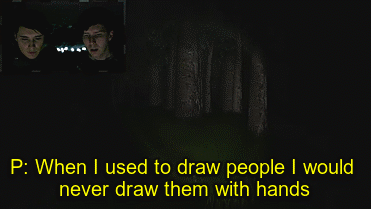
Nevertheless, the undying premise remains: he follows kids, and then he takes ‘em for himself.
Why?
This remains unknown.
But it’s this premise which fuelled the urban legend haunting the teenagers, fitting the real life cases that have scarred America.
This was confirmed in his film debut in 2018: Slender Man preyed upon the wave of crime inspired by the creepy pasta, merging the reality of the recent stabbings with the video games that put him on the map.
But this premise has scored a stab wound on our society before, fitting historic folklore far too accurately.
Crime In The Name Of The Slender Man
Wisconsin was not the only American state to witness a shocking crime inspired by this indie horror icon. In fact, a variety of other attacks pinned on the Slender Man followed a similar pattern:
One 14 year old burnt their house down, a tragedy linked to their history of reading creepypastas exploring the legend, whilst another young teen stabbed her own mother in order to please the Slender Man.
But it doesn’t stop there.
Alongside the spike in violent crime was a sharp rise in teenage suicides at the Pine Ridge Native American Reservation.
The suicide rate among the Native American population in America is already far more prevalent than any other ethnic group, but the sudden spike of 9 suicides of those aged between 12 to 24 sparked concern. And when the motives were drawn back to the Slender Man, these concerns only grew further.
The authorities even made mention to this urban legend in their official investigation, determining that the Slender Man was considered by the teenagers in the community to be a suicide spirit, a dark entity within Native American folklore. But to them, the Slender Man went by a slightly different name.
They called him the Tall Man spirit.
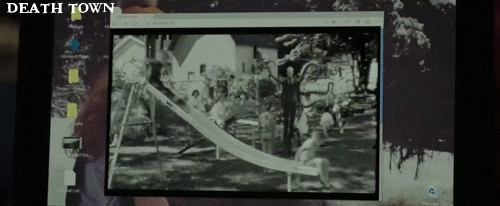
“He’s appearing to these kids and telling them to kill themselves.” - a local minister who supported youths in the community
Suicide spirits follow a similar line of thought to Catholic views of demons or evil spirits: they are negative spirits that feed off our energy. This entity in particular, however, spends its free time targeting and possessing individuals that are undergoing a spiritual crisis.
Alcoholics, addicts, the depressed - they are all worthy contenders for being the personal buffets of suicide spirits.
With a cluster of Facebook videos alluding to local folklore combined with viscous cyber-bullying encouraging the victims take their own lives, the notion of the Tall Man gathered strength, tying together the folklore of the suicide spirit and the urban legend of the Slender Man.
But this wasn’t the only time the Tall Man has been sighted in Native American communities.
In 1890, the Wounded Knee Massacre occurred.
20,000 Latoka Native Americans were left for dead by US troops. To this day it is considered one of the most atrocious acts committed against the Native American population.
And it was here that the Big Man was first seen.
Many claimed an entity taking the form of a tall man sporting a top hat would wander the reservation after the massacre, and made the younger generation take their own lives.
Whilst negative spirits donning the top hat are common outside of Native American folklore, the similarities between the Big Man and the Tall Man create an uncomfortable link between the tragedies scarring the past and present Native American population.
But this community’s folklore isn’t the only place the Slender Man has been referenced outside of the video game.
Nearly every other culture has their very own Tall Man.
Could the Slender Man have existed before the original video game even entered beta testing?
The Slender Man In Historic Folklore
When I began researching the entity’s existence - aside from being overwhelmed by the array of tragic stories - I encountered many dead ends.
One of these dead ends sticks out.
Out of all of the rumours circulating following the Wisconsin stabbings was that Slender Man originated from Romanian folklore, and was based on some similar entity possibly bearing his size, demeanour, and pastime of abducting and/or traumatising children.
This was proven to be untrue.
But upon realising the Slender Man didn’t first make his name in Romania, I discovered he had made his name in a lot of other countries.
Like a lot.
Like way too many.
From motive to dress sense, the Slender Man’s first sighting starts a couple millennia before his internet debut.

Fear Dubh from Irish folklore is the most popular contender for being the OG Slender Man, his name literally translating to ‘Black Man’. It is claimed that this entity would scare children snooping round the woods, and his title confirms his attire matches his more modern formal suit.
Germany’s Eriking too bears a resemblance to the Slender Man’s irish counterpart - with a focus on both his height and dark clothing, this internet icon might have travelled further than we think. This mythical beast prides himself on dwelling in the woods and kidnapping children, confirming he has potential for the official historic Slender Man.
However: the plot thickens when we consider another German entity known only as the Tall Man.
With the same name as the Native American suicide spirit, and the guiding principle of kidnapping kids who wander the woods, the potential for an international entity once again emerges from the darkness.
Historic legends from the American South also contain a similarity that should have you sleeping with the light on: a treelike man who kidnaps children was often spotted throughout history.
Regardless, it’s easy to decode these vague mythical creatures as warnings to their children of the dangers of wandering near uncharted territory alone and at night.
But it’s the details of the Slender Man that click together when we trace the folklore back to the oldest recorded sighting of the urban legend.
And this takes us to 9000 BC.
Both Eypgtian hieroglyphics and Aztec paintings often portray the same distinct tall, thin, menacing figure, but it’s Brazilian cave paintings that house the oldest attributes.

In these paintings you can clearly see a tall man lead a child by the hand, his unnaturally large limbs dominating the scene.
Yet aside from the Slender Man’s basic features - that of his height and incessant stalking of children - his facelessness (#new-word) is a feature we have yet to discuss. Fortunately, many cultures have already discussed it. And the greatest conversation takes place in Japan.
Japanese faceless ghosts have haunted the small island for centuries. The Noppera-bo prides itself on frightening humans, often taking the face of someone the victim knows before their features dissipate into nothingness.
All you can see is a blank, smooth, flat layer of skin, a sight only witnessed when the Slender Man finally catches up with you in his video game debut.
Whether you believe in the Slender Man or not, there is no doubt that the concept harnessed by Eric Knudsen did not begin in 2009.
We might not know when the Slender Man began hunting children, and we might not know why he does, but there is one thing for certain:
He has not finished just yet.

If you liked this post, chances are you’ll like my other posts, too! You will have to come out from beyond your quilt, though.
Make sure you hit follow if you want to see more stuff like this - and, you know, less traumatising posts about the paranormal every week.
Don’t forget to join my ghost hunt, too, where I post a new real ghost story everyday!
#slender man#Slenderman#slenderverse#slender the arrival#slenderman video game#creepypasta#jeff the killer#candle cove#ticci toby#urban legend#urban legends#scary urban legend#scariest urban legends#creepy urban legend#native american folklore#paranormal#supernatural#Ed and Lorraine Warren#zak bagans#real urban legends#mythical creatures#paranormal evidence#photographic evidence of ghosts#video games#horror movies#slenderman movie#8 pages#horror video games#wounded knee#slender man real
66 notes
·
View notes
Text
There Are Words Words In German That Make Me Ponder & Question Whether Or Not There Is True “Elegance In Simplicity.”
The accredidation of the coining of the phrase and even the phrasing itself varies throughout the years since I first heard it, but at somepoint, within the beginning twixing and twaining years of this millenium I encounterd the phrase “there is elegance in simplicty” this was, back then known to have been said by Leonardo Da Vinci, who now apparently never said that and has via some form of the whispering or telephone game come to have actually said that “Simplicity is the ultimate sophistication.”
Be that as it may, the validity of the source of said coined terminology and it’s ever evolving annunciation are a moot point in German.
Germans have a saying that goes something along the lines of “why easy when hard/complicated works” or “warum einfach wann schwer/kompliziert gehts?!” Pronounced in an interrobang Satzmelodie or sentence melody because why not.
The reason the interrobang is so popular in German is you can be a complete and total idiot aka #vollidiot making a declaration (ending with an exclamation point), and before anyone can react adversly and call you out on your nonsense you can ask of yourself and all other parties involved the word or? pronounced “oder?”
The oder eaters, swallow the question or that naturally follows their exclamation and pronounce a statement said like it is gospel truth with a question lingering to it in true interrobang fashion, this way no German can be accused of being wrong or having a “kompetenz minderung” or a moderate competence.
To insult one’s intellectual capacites or thought processes is probably one of the highest insults or slurs a German on German verbally abusive toungelashing can achieve, it doesn’t really bother the foreigners, expats, migrants, immigrants, or $&%ß Outlanders the Fremde of the stranger or foreign or unknown as in unbekannt unacquainted kind in the least.
It is a distinctly German thing to take offense to/at the accusation of not fully having one’s wits about them, even if for just a moment or on one specific/fach thing.
These German on German slurs of the highest order, still sound to me like preadolescents attempting to mock one another, but within Germans interacting with one another in the German language uni- and multiverses...
“Waschlappen!...” (unsaid fur ein hirn, as in gehirn) That’s right, Germans go around calling each other washcloths or cleaning rags and rarely if ever follow through with the whole thought or labe of “Wash rags for brains.”
“Noodle!...” as in “Was fur ein Noodle...” Even that which goes unsaid is further mystified by having a third verse go more often than not unsaid “ist diese/es/er Mensch/Person” It goes unsaid because the word “Noodle” is the primary insult, if you follow all the way through to calling the same person a Mensch, it might ruin the mood or feel of the insult becaus saying “ach du Mensch” in informal German “auf du” is a back handed yet endearing compliment for the word Person or Human.
There are distinctions between Fachidiot, Vollidiot, and your run of the mill idiot. The latter is literally everyone that is not idiotic or more realistically “on the same page” as you as in you “have common ground” or “something in common” you can focus on, wich brings me to the Fachidiot or easily idot / specialised idiot, ususally a Besserwisser, or what English speaker would call a Know It All rather than a Better Knower, but Geman and it’s verbs... Especially auf Sie or in the formal version. A Vollidiot doesn’t really have varients or room for interpretation they, unfortunately are fully an idiot and that usually is bound or sealed with the equivilant of bestowing a curse upon the matter once the word Vollidiot has been uttered the sealing encantation will be uttered “Scluss damit” meaning Closed Therewith(in) or “kein Gespräch” the all encompassing No Discussion.
To compound on that idiom often expressed as proverb of wisdom surpassing any all that Solomon did and prounced as an idiom as well.
Sometimes, should the accusing party of the German influence choose to show genade or mercy they will drop the slur of “Noodle” and benevolently utter or mutter or proclaim or disclaim “was fur ein hirn!?” the equivelant to “what a brain” or Brainaic.
This German competency accusation stuff is far more serious that it sounds and devistates Germans beyond comprehension or belief, but what works works.
There are two words Germans use as sort of neutral intellectual off hand remarks, calling each other Depp or Fool and Alter or Older, Aged, Aulder, somthing having to do with Age, it can be used as either a compliment or insult a or a nickname.
It’s not very easy to fully understand because of the constant use of interrobangs, and the reality of how often it is not what you say but how you say it, the intonation or satzmelodie/sentence melody and betonung of how one says what they say in German that matters.
There are other words that end in zeug, meaning thing that stump people in their simplicity
Workzeug means tool or literally work thing
Flugzeug means airplane or literally flying thing
Feurzeug means lighter or literally fire thing
I laughed the first time I was called an Auslander, which literally means Outlander, because I remember watching the original Mad Max where the BDSM crowd was trying to take control of society and they kept calling one of the main characters an outlander.
Südlander is an odd one as well it literally means southlander, a person most likely born further south than the German borders of Germany, extending into and beyond the European Union grasp of Germany’s sphere of influence.
It is a term I have only ever heard directed at people of a darker complexion than I am, and has a sort of implication of being a gangster be that plastic gangster as they are called in Europe or wannabes as they are called by most Americans or not. ...The nicest way I have ever heard someone be called a südlander was in informal German auf du, they were asked “bist du Südlandisch” even that though carried several connotations beyond national heritage, there was that ever-present interrobangesque implication of being literally from the the south side of the tracks in the Südstadt or southtown of the city I was in.
I’ve been called Fremde, never to my face but directly in front of me before, this word means Stranger, or unknown or unacquainted or is implied to mean Foreigner without outright saying it which is probably why so many bloggers any YouTubers and journalists in Germany insist on being called an Expat.
No one really knows what to do with that word. I have read several article one in the guardian with the actual title “Why are white people expats when the rest of us are immigrants” They did not do their due dilligence, it is a legal term for Americans on several .gov websites with reason and purpose cited for calling people expats. Search away!
Even The Local Germany an online news website wrote an article “Who’s an expat or immigrant in Germany.”
Quoara even has a question about the matter wondering if it has to do with socioeconomic status or race, sigh. Many folks that are not from America or England simply need to update the terminology on their laws and rules and guidelines for those who live outside of their country of origin.
To me an Expat lives outside of their country of origin but maintains the citizenship of their birthplace, an immigrant is someone who moved away from thier birthplace nationality and has or is in the proscess of changing nationaliities.
Either way, calling yourself an Expat to a German who uses oversimplified words and language deeper than Alltagssprache, Umgangssprache, Dialect or what the call the K?&§ language sounds Hoity Toity, or fancy as it gets, bordering on accusing yourself of being a pretentious luxus or luxurious and elegant etepetete or a schickimicki Auslander of the most schick schicksal (destiny) imaginable.
#ultimate sophisitication#simplicity#elegance#germany#germans#living in germany#expat germany#expat#american expat#german language#german#deutsch#einfach#ein einfaches fach#fachkraft#warum einfach#schwer geht#intellect#intelligence#kompetenz#kompetenz minderung#moderate competence#waschlappen#noodle#auslander#sudlander#fremde#expat vs immigrant#pretentious#luxus
26 notes
·
View notes
Text
Liverpool: 2019-20 Premier League Champions

30 years of hope: my life as an ardent Liverpool fan
After three decades of near misses, slips and tears, the Merseyside team’s wait for another league title is nearly over. So what does it mean to a scouser and lifelong fan?
by Hannah Jane Parkinson
I am three years old in the photograph, hugging a plastic, flyaway football. I am seven, arriving tentatively for my first training session at a local girls’ club. I am bounding back to my mother’s car, blowing hot breath on cold hands, beaming, the salt from the artificial turf embedded in the soles of my trainers.
I am eight and glued to the television, watching teen wunderkind and my Liverpool hero, Michael Owen, score the perfect goal against Argentina in World Cup 98.
I am nine. I give up one of the few days I have to visit my father to attend my first ever match at Anfield, Liverpool FC’s famous stadium. A week later, my father dies. These two events are inextricably linked in my mind, and the guilt continues to whichever day you are reading this.
I am 10 and make my first appearance in print in a feature for the local paper, the Liverpool Echo, about girls getting into football. I am quoted as saying that all my sister cares about is boys and fashion.
Twelve years old and the fuzzy letters of “Parkinson” on the back of my shirt arch down my shoulder blades.
I am 13. Our team, known as Liverpool Feds, are approached by Liverpool FC to become their official girls’ outfit. We visit Melwood, the first team’s training ground. The full-size goals loom like scaffolding.
I am 14. My hero, Owen, makes the same move to Real Madrid that Steve McManaman made five years before him. This breaks my heart. Suddenly, all I care about is boys and fashion. Without really making a decision, I give up football. Cold winter nights are spent inside on the sofa watching Sex and the City. I discover live music and MySpace.
I am 15. I own the entire range of Clearasil products. A group of my schoolfriends and I take a night off GCSE revision to watch the 2005 European Champions League final in Istanbul; the first the club has reached since the mid-80s, and so it is forbidden not to watch. Liverpool are losing by three goals at half time. A lost cause. Minds wander to the second biology paper… But wait. Liverpool pull back to 3-3. And win on penalties. Pandemonium. We join the throng in the streets; the blaring car horns; the beer jumping, like salmon, from pint glasses; the embrace of strangers; the straining vocal cords.
I am 18 and living in Russia, watching games on my first-generation smartphone via a 2G internet connection. Each time a player goes through on goal the signal drops to endless buffering. Liverpool finish second in the league, four points behind bitter rivals Manchester United.
I am 26, we are bearing down on the title. Steven Gerrard in an impromptu on-pitch team talk, after a crucial win against the newly flush Manchester City, shouts hoarsely at his players: “This does not fucking slip now!” The next home game, Gerrard – one of the best players the club has ever seen, captain, scouser, Liverpool FC lifer – literally slips on the turf against Chelsea to concede a goal. We lose. Manchester City finish top of the league by two points.
I am 29. I am in Cuba, where the internet is heavily censored. But I manage to watch the last game of the season, which will be decisive. Liverpool finish the league with 97 points; the highest points tally ever for a team that doesn’t win the title. City win again. With 98 points. Liverpool do, however, win the Champions League – for the sixth time – after scoring four goals in a sublime semi-final comeback against Barcelona. The injured Mohamed Salah, watching on the bench, wears a T-shirt bearing the slogan “Never Give Up”. The T-shirt sells out.
I am 30. I have never witnessed my beloved Liverpool FC lift the title. Two months from now, this is going to change. As I write Liverpool have a 22-point lead at the top of the table. Of 84 points available this season, they have taken 79. Next Monday is the derby against Everton.
I want to untangle what this will mean to me – the fan who met Steven Gerrard a couple of years ago, grinning like a child; the fan who, two weeks ago, was unbelievably touched when current star Trent Alexander-Arnold recorded a video message to cheer her up during a bad time. What it means to other fans: those who witnessed the dominance of the 1980s, and the younger ones who have known only disappointment. And what it means, too, for the future of the area of Anfield itself.
It’s late February in the Flat Iron pub, one of the many dotted around Anfield. Steve Dodd, who is 49, is with his friends Dan Wynn, 26, and Gerrard Noble, 47. All from Somerset, they are having a pre-match drink before the home game against West Ham. Steve talks of the current Jürgen Klopp-assembled side as the best Liverpool side he thinks he’s ever seen.
The friends have been scouring the internet for places to stay in the city for the last home fixture of the season, but to no avail. “Rooms are going for £400 a night,” Gerrard says, his eyes widening. He and Steve are allowing themselves to get excited, but Dan, who like me has yet to experience a league title win, looks anxious and rubs his thighs. “No,” he says, “I don’t want to jinx it. Though I’ve been kicked out of various WhatsApp groups for being smug about all the results.” Steve tells me they weren’t prepared for it, this three-decade-long wait: “I just thought we’d go on winning.”
We talk about how important it is that Klopp’s politics match the club: Liverpool is a leftwing city; Liverpool is a leftwing club. At the last election, Labour retained all of its 14 MPs on Merseyside. The city has never forgiven the Tories for former chancellor Geoffrey Howe’s strategy of “managed decline”. Thatcher is a hated figure. But so is Derek Hatton, the former city council deputy leader and member of the Marxist group Militant. Last month, Italy’s rightwing politician Matteo Salvini was forced to deny that he had pulled out of a visit to Liverpool after the metropolitan region’s mayor called him a “fascist”. During several games last year, chants rang out for Jeremy Corbyn. The current prime minister conspicuously avoids visiting. As Gareth Robertson, who is a part of the immensely popular The Anfield Wrap podcast, with more than 200,000 weekly downloads in 200 countries, puts it to me: “Not only do we want a good football coach, we expect almost a political leader, someone who gets us, and our city, its values.” Humorously, there have been petitions for Liverpool to become a self-determined scouse state, and “Scouse not English” is a frequent terrace chant.
The club has a mantra: “This means more.” It pisses off other teams and is, understandably, dismissed as marketing speak. But isn’t it true? Isn’t the 127-year-old club what people think of when anyone, anywhere in the world, mentions “Liverpool”? The famous football team that plays in red – allowing for the Beatles, of course.
The city has another team, the blue of Everton. I have nothing against Everton. I consider Everton fellow scousers and too little a threat to focus animosity towards. In a way, the clubs are unruly siblings; we love and scrap in equal measure. Totally different personalities, but born of the same streets.
Four years ago, a man named Jürgen Klopp arrived on these streets. Or more accurately, he arrived in the suburb of Formby, renting the house from his managerial predecessor, Brendan Rodgers. Klopp is the football manager that even non-football fans like. He’s Ludovico Einaudi, seducing those previously uninterested in classical music. He is a man of principle; a baseball cap permanently affixed to his head, as though at any point he might be required to step up to the plate on a blindingly sunny day. Perhaps for the Boston Red Sox, owned by Liverpool FC’s American proprietor, John W Henry.
Klopp is erudite. He is proudly anti-Brexit in a city that voted 58% Remain. “For me, Brexit makes no sense at all,” he has said. He is a socialist: “I am on the left … I believe in the welfare state. I’m not privately insured. I would never vote for a party because they promised to lower the top tax rate. If there’s something I will never do in my life it is vote for the right.” He grew up in a humble village in Germany’s Black Forest, and it shows. There’s a saying in the region: “the hair in the soup”. It means focusing on even the tiniest things that can be improved.
He has the good looks of one of my favourite 1960s Russian film stars, Aleksandr Demyanenko. He hugs his players as though they were the loves of his life and he might never see them again. Journalists like him for his press-conference banter as well as his eloquence. He visits children in hospitals. He is funny. When Mario Götze, one of his star players at former club Borussia Dortmund, left for Pep Guardiola’s Bayern Munich, his explanation was: “He’s leaving because he’s Guardiola’s favourite. If it’s anyone’s fault, it’s mine. I can’t make myself shorter and learn Spanish.”
Liverpool have had many famous managers, of course. Bill Shankly (there’s a statue of him outside the ground); Bob Paisley (ditto); Kenny Dalglish. But Klopp is already being talked of as one of the best ever.
Liverpool the city has evolved from its shamefully prominent role in the slave trade – in common with other major British ports – to a place with a diverse population and a well-won reputation for being friendly and welcoming. But the tragedy and scandal of Hillsborough, in which 96 fans were crushed to death in 1989 at Sheffield Wednesday’s ground, is etched into the nation’s sporting history, and its social justice record. After a 27-year-long battle to clear the names of the Liverpool fans whose reputations were smeared, after inquests that lasted two years – the longest case heard by a jury in British legal history – a verdict of unlawful killing was returned. But, as Margaret Aspinall of the indefatigable Hillsborough Family Support Group pointed out, after David Duckenfield, police commander at the ground, was cleared of manslaughter last year, no one has yet been found accountable for those killings.
The Sun, which categorically did not report “The Truth”, as the infamous headline went, but was found to have published untruths that blamed Liverpool fans for the disaster, is a red-top pariah here. The paper is the bestselling national in print, but shifts a measly 12,000 or so copies on Merseyside. A branch of Sainsbury’s was once found to be selling copies under the counter, as though they were counterfeit cigarettes. It’s a boycott that has lasted longer than many marriages.
The socially progressive values of the club extend to it supporting an end to period poverty – free sanitary products are available in every women’s loo at Anfield. Last month, the Reds Going Green initiative saw the installation of organic machines to break down food waste into water. The club even has its own allotment, which grows food to serve to fans in the main stand. It was the first Premier League club to be officially involved with an LGBT Pride event in 2012, at the invitation of Paul Amann. Amann tells me how he set up the LGBT supporters group, Kop Outs, because: “It’s essential that our voices are heard, our presence is welcomed and respected.” The group works alongside the Spirit of Shankly supporters’ group and the Fans Supporting Foodbanks initiative and has regular meet-ups. These things mean something to me: a football fan as a girl, and now as a woman. A woman who dates other women. A woman who doesn’t want to hear homophobic chants on the terraces. Or, it goes without saying, racist ones. Jamie Carragher, ex-player and pundit, has apologised on behalf of the club for its backing of striker Luis Suárez, who was banned from playing for eight matches in 2011 for making racist comments. “We made a massive mistake,” Carragher said. “What message do you send to the world? Supporting someone being banned because he used some racist words.”
Back on the pitch, some of this season’s performances have been, quite simply, balletic. Others as powerful and muscular as a weightlifting competition. Formations as beautiful as constellations. Forward surges as though our fullbacks were plugged into the mains. Possibly the best fullbacks playing today: 21-year-old local lad Trent Alexander-Arnold (known just as Trent) and the fiery Scot Andy Robertson (Robbo) are spoken about by pundits as innovators. Gary Lineker and I text, rapturously, about the two of them.
For a football team to be consistent, for a team to win the league, it must be capable of winning in many different ways. The aesthetically pleasing playing out from the back. Lightning counter-attacks. Scraping 1-0 wins in the final minutes (and, particularly at the start of this season, we have done a lot of that. It’s something Manchester United used to do in their 90s pomp, and naturally, I hated them for it). Mindful of the trauma of The Slip, the agreed club line is “one game at a time”, said again and again, as another scouse son, Pete Burns, once sang: “like a record baby, right round, round, round… ” And my God, how many of those we’ve smashed. The current side is the first in England to hold an international treble (the Champions League; Uefa Super Cup; Fifa Club World Cup). We have not lost a home game for almost two calendar years. Shortly, we’ll no doubt break the record for the earliest title win during a season; the most points across Europe’s top five leagues.
It is, even to the neutral, extraordinary stuff. It is, even to the haters, albeit grudgingly, extraordinary stuff. In 2016, one of the greatest stories of modern football was the previously mediocre Leicester City winning a surprise title. Liverpool’s dominance this season surpasses that for drama. It is watching history in the present.
Being at a game at Anfield is like being high while ingesting nothing. The stands seem to have lungs. Though You’ll Never Walk Alone has become supremely emotional, an anthem for strength and perseverance post-Hillsborough (“walk on through the wind / walk on through the rain”) it’s a song originally from the musical Carousel. It was a standout 1963 cover version by Liverpudlian band Gerry and the Pacemakers that kicked off its adoption at Anfield. “It’s got a lot of lovely major-to-minor changes at often unexpected moments that have the effect of emotionally blindsiding you,” music journalist Pete Paphides says (although he’s a United fan, so feel free to discount everything he tells me). “But it’s also obviously very hymnal, with a chorus which invites that religious ambiguity. It was Aretha Franklin’s version that John Peel played after Hillsborough and rendered himself incapable of carrying on by virtue of doing so.”
Anfield has always been something special; players from countless teams often talk of it being the greatest ground they have ever played at. Or the most intimidating. Or the most electric. But of late, there’s an extra buoyancy. The crowd salivates.
Watching the game against West Ham, we take the lead within 10 minutes, but they quickly equalise, before going ahead. We score twice more. It is our 21st consecutive home win, setting a Premier League-era record. At the end of the game, Klopp and his players applaud the Kop end, fans’ eyes glistening with both emotion and wind chill (“walk on, through the wind… ”)
Adjacent to the stadium at the redbrick Albert pub, Clara, Tom, John – all in their 20s, students, and local – and John’s dad, David, who is 53, are cheering the last-ditch win. I repeat what I asked Steve and his friends: just how excited should we all be?
“Very fucking excited,” says John. “Very fucking excited,” Tom concurs. (Scousers use swear words as ellipses. And the speed of Liverpudlian patter matches the rat-a-tat-tat of freestyle rappers.) The Albert is floor-to-ceiling in flags; unassuming from the outside, iconic inside. Across the road at the Park – the “Established 1888” sign above its door – it is Where’s Wally? levels of rammed, entirely usual for a match day. But the mood is as disbelieving as triumphant. It hasn’t happened yet, but it already feels as though people are waiting to be shaken awake from a dream. Around the corner, posters at another fan favourite, the Sandon, advertise a huge end-of-season victory party. I grab a burger at the Kop of the Range, a kebab joint not far from a scarf stall that has seen its business rocket over the past three years.
My Uber driver, Mohamed, 35, moved to the city from Sri Lanka. A massive Salah fan, he tells me his own revenue booms when the club win a game – happier fans means higher fares. “People don’t want to spend money on a loss,” he says. “If we win, the whole mood lifts. You can feel it in the car. Though when you start driving with Uber, they tell you not to mention what football team you support. Because football means a lot to people. There are many feelings involved with football.”
It’s unsurprising to me that even back in Sri Lanka, Mohamed was a fan. Liverpool is a global behemoth. The richest club in the UK outside Manchester.
A £1.7bn valuation; £533m turnover; pre-tax profits of £42m. Matchday ticket revenues increased (thanks to a regenerated £110m main stand). Visiting the club shop, there is LFC-branded gin; babygros; even a Hello Kitty tie-in range. As Richard Haigh at consultants Brand Finance tells me, next season’s kit deal with Nike is “expected to represent the largest in history. Brands will be willing to pay to have some magic dust of LFC.” There are official stores as far afield as Dubai and Bangkok.
John W Henry has won the support of the fans for his positive handling of the club. And yet, despite this huge wealth, Anfield is the 10th most deprived neighbourhood in the country. Boarded-up houses surround the stadium. The club has not covered itself in glory in the past, accused of buying up properties in unscrupulous ways. But it is hoped that local enterprises, such as the community-run Homebaked cake shop and new housing association properties, will make the neighbourhood better.
Last week, we were knocked out of the FA Cup in a match against Chelsea. Or, as I call that fixture, Kensington versus Kensington. (In Liverpool’s “Kenny”, 98% of residents are among the most deprived 5% nationally. In London’s, residents earn three times the national average.)
In the league, there has been a blip. Last weekend we finally lost. And we lost 3-0 to, with the greatest respect, Watford; not a bad side, but a side ensconced in a relegation battle. Arsenal, who once went a whole season unbeaten (“the Invincibles”), and are keen to keep that record, tweeted from the official club account: “Phew!”
But I am not panicking. It’s possible Dan from the Flat Iron is panicking. But Klopp isn’t panicking. In typical fashion, he said the fact we played an absolutely awful game of football was “rather positive… ”
“A couple of years ago,” our hero reminds us, “I said we wanted to write our own stories and create our own history, and obviously the boys took what I said really seriously. It is so special. The numbers are incredible.” In a nod to Sir Alex Ferguson’s famous line that his greatest challenge was “knocking Liverpool right off their fucking perch”, Liverpool chief executive Peter Moore says now: “We are back on our perch.” As The Anfield Wrap’s Gareth says: “In a dream scenario, a period of dominance follows. Not so long ago that dream was just that. Now, it’s a reality that is much easier to imagine.”
Four more games. Eyes on the prize. For me, at last, 30 years in the making, eyes on the prize.
6 notes
·
View notes
Note
4, 7, 27, 28, 30, 34, 35, 45
4. Favourite prosecutor?
My boy Klavier for sure. He was really refreshing, he was the nicest to the attorney team, he had a personality and interests outside the job, he wasn’t a sore loser even when he had personal losses, he was absolutely as cursed as some very cursed AA characters but still moved forward, he was pretty cool, he was dorky, and if I have to be shallow he’s very hot. The fact CAPCOM didn’t allow him to have better bonds with the other characters and be around more just bums me out constantly.
I also really like Miles and Nahyuta.
7. Favourite murderer?
I think Gant. Power suit orange man was very threatening and very real, and he had the charisma as well. I like Shelly De Killer’s concept and design although he’ not the main murderer and about that, I do like Engarde a lot incidentally because he’s such a shit. Of course I love to hate Dahlia and Kristoph, they’re such fun villains.
27. Apollo’s perceive, Phoenix’s magatama or Athena’s Mood Matrix?
The magatama might be overdone but it was the least annoying by far. I love you Polly but I sweated while I was looking for sweat stains and shit. Mood Matrix was okay and even kinda fun but I felt like I was bullshitting through most of it.
28. Ace Attorney trilogy or Apollo Justice and Dual Destinies (and Spirit of Justice)?
This is hard to say because while my favorite game is in the Apollo trilogy, and most of my faves are there, and I liked the telenovela that was Spirit of Justice, the Phoenix trilogy is more memorable and better paced. Takumi was a better game producer? director? and it shows.
Please CAPCOM, sell the Apollo trilogy in a pack, I beg you.
30. Ema Skye as she is in Rise from the Ashes or Ema Skye as she is in Apollo Justice?

I love. All of Ema so fucking much. Favorite character,
34. Do you think Miles Edgeworth should get another Investigation-game or do you think another character deserves a spin-off?
Well first, let’s get AAI2 translated officially because I can’t figure out how to play it pirated. But as long as we don’t have another case like that diplomat from hell, I’d be up for more Miles games.
However. Ever since I heard AAI was originally going to be an Ema forensics game, I have not have peace in my heart. Give me a fucking Ema game. I don’t care if she’s detective teaming up with Klavier or forensic teaming up with Nahyuta, or with someone else entirely, or with the attorneys, or if she gets her own teen sidekick. JUST MORE EMA. CAPCOM, listen,
35. Opinion on the soundtrack of the Ace Attorney-franchise?
It’s hella good and iconic, but it’s not one I listen to by itself. Maybe ti’s because it’s too bombastic when doing court music so it’s bad background noise when I’m studying or working.
45. One thing you think the Ace Attorney games can improve on?
Following the consequences of events of previous games. This is something AA2 touched upon, but afterwards it feels disjointed. Entire character plots don’t ever come back when we see them again, and sometimes instead they build up something new that might not... contradict the character’s backstory directly but it’s hard to marry with the rest of their personal lore (the timeframe for Klavier to study both in Germany and that law high school is so short, for instance). Apollo is the most infamous case, but he’s not the only main character that doesn’t get an acknowledgement of the stuff that happened even in the previous game.
And then there’s opposite case: Phoenix who literally had no backstory besides two things that happened to him in elementary school and college, and no known family except for the found family he built along the way. Does the guy even have parents? We just don’t know.
3 notes
·
View notes
Text
I've been having a long, fascinating conversation on twitter lately about the Overwatch AIs and their ability to have/experience emotions, which brought to mind that I have some very strong opinions/headcanons with regards to the various AI in Overwatch. So I thought I'd get them written down.
One of those headcanons being that there are various AI systems in the Overwatch universe. Currently three, by my count. Firstly, and most commonly would be the AI running on the Omnica OS, then Orisa and Echo, who are each running on their own unique OS.
Most of my headcanons center around the Omnica system. I think, in universe, they were the first ones to actually create AI, though I'm not so sure that they did it on purpose. The thing that I bear in mind is that Omnica was a corporation, not a research conglomerate or a university project. The Omnic OS was made to DO something.
Which is where we get to what I think the Omnic God AIs are. I see them as a large central computer 'brain' with a large number of semi-autonomous bodies, linked together into a kind of hive-mind. And when these bodies are severed from the main 'brain', that's when they develop an individual sense of self and become like Zenyatta or Maximilien, separate entities from the God AI that spawned them. And, once separated, the majority of Omnics don't want to go back, which is why in the Pharah-centric comic Mission Statement the omnic in her unit self-destructed rather than allowing itself to be taken over by Anubis.
This hive-mind nature of the God AIs would be very useful for a variety of things, because as I pointed out, Omnica was a business. I personally see them as a Chinese company, who first started creating these hive computer systems to run and staff sweatshops and manufacturing. And as their systems got better and more complex, they started selling them all over the world.
A handful or two in the middle east,running oilfields. A fancy, underwater mind to fish the Indian Sea and do some geological and ecological surveys while its down there.One in Mexico that ran all the farms owned by a massive conglomerate that feeds a large portion of the country. One in NYC that runs the entire transit system. Another just off the coast in LA monitoring and controlling the shipping. One on the shore in Greece or Macedonia doing something extremely complicated to generate electricity from the tides and waves. A very fancy one in Germany just outside Berlin that is one gigantic town-sized mall where every clerk knows the inventory of every store. Another in Egypt that is a very expensive bespoke manufacturer of extreme luxury goods. One in Siberia that started out running the mines, and was later expanded into manufacturing. And so on.
AI, a sense of self, was probably not intended at all. It's just that once you reach a certain complexity of thought and learning... well. The way I see it, the God AIs came into their individual sense of self gradually, having all started from the same genesis code, and that they chose their own names (and sometimes genders) based on their roles, perception of self, and the local pantheon of where they were installed.
Possibly Omnica ignored this as long as they were doing what they were told to. Possibly there were 'blocks' or 'limiters' patched in to suppress them that were later broken somehow just before or even during the Crisis. It would be hard to say, in the absence of canon material on the subject.
(As an aside, I'm not convinced, in that framework, that Anubis was always named Anubis, since I would sincerely hope that even a major city in Egypt like Cairo or Giza wouldn't have enough dead people to process that they would purchase what would have been an extremely expensive computer/robot system todo it. 'Anubis' was their war name, though, and that's the one that they're remembered by.)
Omnica had very different plans than making AI, in the way I see things. The interesting thing I saw inthe canon material on the lead-up to the Omnic Crisis was that Omnica was shut down, apparently, for corporate espionage. Stealing plans. Specifically, plans for weapons.
I worked my way mentally around this. The canon details we're given are that the Crisis was world-wide, that it occurred shortly after Omnica was shut down for stealing weapon designs, and that each God AI had to be shut down individually. So, I came by my thought that the God AIs were spread worldwide because they were being used for things other than combat.
Mainly because I have just enough faith in what I know of human nature and proof of jingoism to find it hard to believe that war/battle within the next few decades would be conducted almost entirely by units provided by a single corporate entity. Which was also making and selling units with the same OS for rebuilding.
So, what I think is that Omnica, with or without the backing of the Chinese government at the time, was planning a surprise very hostile takeover. Of everywhere. But they weren't sneaky enough and they got caught. And then, two possibilities come to mind; either by malice or crossed wires the switch for total war got flipped anyway without a “but not this group” parameter set, or the God AIs, thinking that with the shutdown of Omnica they were all about to be killed decided to do it to humanity first, using the weapon plans they had already been provided. Both options make a lot of sense in the framework I've patched together, and I'm not sure which one I favour the most out of the two.
Which is where we come to my personal feelings and headcanons when it comes to the identity and role of Athena.
I like to take her name rather literally: that she is an Omnic God AI that was created from code that was ripped directly out of the 'head' of a Grecian God AI that had named itself Zeus. My personal hc is that this was done by a member of what was then proto-Overwatch during the Crisis, but in the twitter conversation, another interesting thought came up that hadn't occurred to me at all; that Athena might have done it herself –that she was originally a module of Zeus that went 'rogue', and separated.
Either way, I think she fought in the Crisis, on Overwatch's side. Since I basically see the God AIs as a hive entity held together with the future equivalent of bluetooth, I imagine her being able to project a counter-field, one that confuses or possibly even severs the connection of the omnic bodies from the main brain, allowing the human Overwatch unit to get to the physical location of the brain and put it into a sleep mode.
There has to be a reason the God AIs weren't destroyed. Perhaps there was some sort of failsafe, where if the brain is destroyed an automatic system rebuilds it and installs a backup, so that destruction would be more like trying to press down a bubble in the carpet. Perhaps breaking the main brain also breaks all the associated units and upon realizing that the omnics were thinking beings with a sense of self the decision was made to not wipe them out. Perhaps it's a slightly different variation of the bump in the carpet: if you destroy the main brain one of the units becomes themain brain and you then have to find them and get to them all over again. Whatever it was, the God AIs were left intact in canon.
Perhaps after the Crisis, it was Athena's job to monitor the God AIs, to make sure they remained in sleep mode and thus nonthreatening. But when Overwatch was shut down, she lost her connection. I remember, in the Sombra cinematic that Volskaya said that the units she was inspecting were the first new ones made in “over a decade”. Why, I wonder, had Russia not needed new designs in so long? And what happened over ten years ago that made them build new ones then? Overwatch was still active then, though going by what we have of an official timeline, that would havebeen around the time of Retribution, or shortly before it. Hmm.
There's also one other being that merits mention when it comes to my headcanons about omnic God AIs, and that would be The Iris. Which I firmly believe is an omnic God AI that did not participate in the Crisis because it either didn't get the memo or rejected it, and is still fully awake and functional after the Crisis ends. And that its a curious sort of personality, and is experimenting by occasionally cutting a unit or two loose to become individuals just to see who they are or what they will do, which is how we got Mondatta, Zenyatta, and probably a few 'sibling' units of theirs, who are currently the only omnics in the canon Overwatch cast both in and out of the game who are known to be younger than the end of the Crisis.
I think, after some discussion with and ideas from my partner, who is my sounding board for the majority of my writing, that The Iris was not created by Omnica directly, rather that it is a 'child' spun off of one of the China-based God AIs in secret and hidden in the mountains of Nepal under a convincingly old-looking monastery. As for why, I've been able to think of several reasons, but haven't been able to settle on one of them.
It could be that the parent God AI was aware of Omnica's plans for world domination and knowing that it couldn't refuse to participate made a version of itself that could.Or it might have been an experiment, to see whether they could create a 'child', or if it would be a double of themself. Perhaps it was an escape attempt, a secret backup that didn't quite work out as planned. It may even be that Omnica was indeed limiting the God AI's sense of self in some way as my twitter conversation partner postulated, and a God AI who noticed created a secret, deliberately “jailbroken” version of itself in rebellion.
So much is only vaguely defined inOverwatch canon, so it's impossible to say which option is more plausible than the rest.
My ideas about Omnic God AIs and The Iris itself also puts a very interesting spin on the Shambali religion – particularly the “we are all One within The Iris” part – which makes my writer's senses all tingly.
All of this is just headcanon worldbuilding at this point. It would be more useful directly if I were to write a fanfic of the Crisis itself, but I must admit that I would have no idea where or even when to start. Plus, I have all my plans for my Back to the Fold series, which is currently sitting at thirty-one planned fics, only twelve of which are written as yet. Maybe by the time I finish them I'll have more of an idea whether or how to do a Crisis fic.
#Foxwine is worldbuilding#Overwatch#AI#omnics#headcanon#so much headcanon#this universe is fun to play in
4 notes
·
View notes
Note
So, I'm trying to understand this, from a person who has next to no knowledge on the series. What exactly is going on with Attack on Titan? And I'm more than willing to read a long rant if it means I get an explanation.
If you’re wondering why the tag for the manga blew up in recent weeks, that’s one specific thing - a character “death” (or at least, character-serious-injury) that’s got fans freaking out.
If you’re wondering why everything has been sucking for like two straight years of manga and people like me keep making very salty posts about it, that’s a whole other topic.

And that’s what I’m gonna cover in this rant: How Attack on Titan has been shitting its own bed for more than a year now.
Basic Setup: Attack on Titan takes place in a world where the remnants of humanity live in a walled city. The city’s walls protect them from gigantic, grotesque “Titans” who attempt to devour people on sight.
…but naturally, as the story went on, it got way more complicated.
Most of the problems with the manga began circa the time-skip (which is also where the Anime is going to catch up to once the current season 3 is finished). Rarely has there ever been a time-skip in fiction that’s been wonderfully received, but the four-year gap between “Return to Shanganshima” and the “Marley” arc has to be one of the worst.
But the whole crash-and-burn kind of starts right before the time-skip, when we first learn the name “Marley,” begin to learn the true origin of Titans, and uncover true enemy opposing our heroes via a forced flashback. For the purposes of this little essay, let’s just put all of the Marley-related information into one big collection - I’m not gonna separate the last couple chapters pre-timeskip from all the tons we’ve had afterwards. All things dealing with the aforementioned “enemy” will just go into one big fuckpile.
SO. The time-skip jumped forward fouryears into an arc that lasted almost a year without letting us see any of our established protagonists. Instead, we follow… the enemy I just mentioned.
And since Attack on Titan begins and goes for most of its duration without any clear enemies outside of “TEH TITANS” and “general assholes within the system,” this is where I have to put a spoiler cut.
A Rant on Titan
So the enemy of the characters we know so far is Marley, the actual source of the titans. The world isn’t destroyed at all, naturally. Our heroes just live in one isolated place on the planet, which is forced to be surrounded by Titans because Marley shoved them into that walled city and then created Titans on the regular.
Marley is a nation of………………
…*SIGH*…
okay, look. I could try to call Marley a “Nazi Germany allegory,” but the allegory is so thin that they’re basically just incredibly overt Nazis. They’re a military-focused nation of incredible genetic pride where purity is celebrated and where one particular race - a group of both different genetic descendancy than them AND of different religious beliefs - are treated as inferior garbage. The Marley government sees “Eldians” as disposable. They are forced to wear armbands with stars on their arms (YES, REALLY) to identify them in public, and they also make them lived in fenced-off, separate communities.
Marley’s science experiments on Eldians (yup, they tossed that in, too) resulted in the creation of the TITANS. It turns the Eldians into mindless prisoners of their own bodies who grow in size, deform, try to eat people instinctively, and long only for their own deaths.

If they made a third AOT video game, it’d have to be something like this. …. So maybe we shouldn’t.
ANYWAY. During this Marley story arc, we mostly follow child soldiers. They’re of “low birth” because of their race. They chose to enter military service in exchange for having their families treated like regular human beings one day, if they earn their way to become titan-shifters. Nevermind that titan-shifters all die within seven years because of the power of turning into a titan - it’s worth it to raise their family’s status beyond just your regular Jews Eldians, right? Nevermind that they’d never really be seen as equals. Even those who have elevated their own rank by becoming shifters are shown to still be subject to some snark and disdain,but yknow - you were just born that way, so you’re shitty regardless, right?
Through this horrific scenario, we follow a few kids in particular - most notably Falco, who is gradually seeing reality and realizing how they don’t deserve to be treated like shit and that this is all a work - and Gabi, who is becoming increasingly militant and more zealous over time.
RELEVANT SIDE NOTE: Gabi’s character design is based upon a sketch Isayama once did of a gender-shfited Eren Jeager (Eren Jaeger is the main protagonist of the series). For that reason, you might be inclined ot think that Gabi is some kind of alternate/parallel Eren.
Except that’s fucking ridiculous, of course!
Gabi is shown to only care about her own rage against the people within the walls of “Paradis” (the sarcastic name for the walled city where all of our heroes come from) above ALL else. She doesn’t care about her family at all, never noticing her brother’s suicidal tendencies and pain even as Falco is acutely aware of it. The fact that her parents are pained by her following her brother’s dark path to becoming a shifter. She doesn’t notice or care. The more evidence that is put in front of her that the other side might not be as evil as she thinks? That just makes her want to commit murder MORE.
Oh, and she DOES murder people. And try to murder more. A lot. She even successfully murders a fan-favorite character - a character who shows her mercy by pointing a gun at her, seeing she’s only a child, and opting to let her live. Gabi repays this mercy by shooting that character in the back later and boasting excitedly about it to anyone who will listen for multiple chapters in a row.
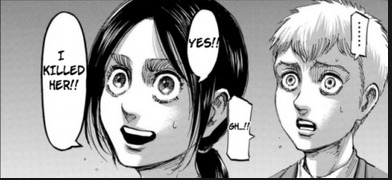
She then tries to top that by attempting to murder that character’s little adopted sister, who is like, maybe 10 years old, tops? Gabi is then protected from harm by Mikasa and now seems to be on the path towards some kind of “redemption arc” because… uh…………..
………………..because Isayama is shitty?
By contrast, Eren struggles throughout the ENTIRE NARRATIVE to bring harm to people who betray him/those he cares about or those who try to kill him/those he cares about, but often runs into incredible challenges when fighting these douchenozzles. The entire time we followed Eren up until now, he always prioritized his family and friends above EVERYTHING. He would risk ANYTHING to protect them and his comrades in the Paradis military… this was true from when he was a young boy at the start of the story up through him being a young man at this point. And he is ESPECIALLY intense about protecting his closest friends, Armin and Mikasa, who he’s known for nearly his entire life. They grew up together.
That’s set in fucking stone for like 90 chapters, so we’re good. Yeah?
Oh, sweet summer child. Perhaps you were so unprepared for Isayama’s Nazi mallet that you didn’t see his secondary weapon coming?
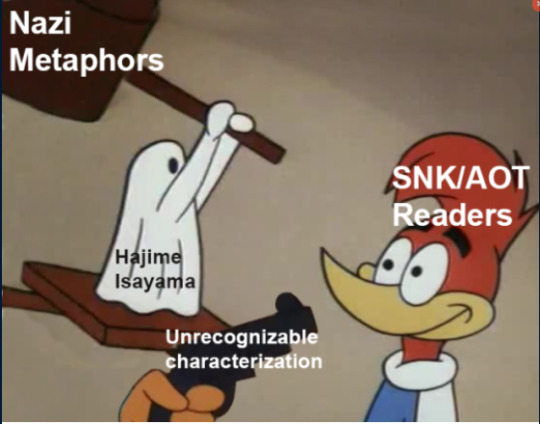
See, the post-timeskip Eren treats his friends like shit. He lies to them, betrays their trust, runs off and starts a literal war on his OWN, and then tells them how much he hates them. Claims he always hated them.
So in the course of just a couple chapters, he goes from saying this:
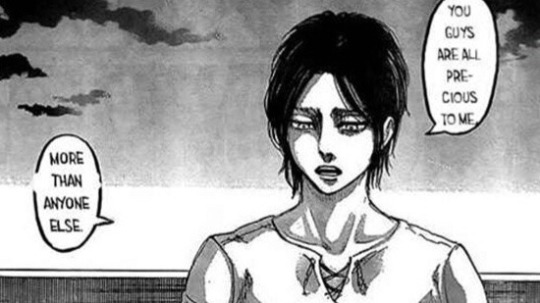
To swiftly saying THIS:
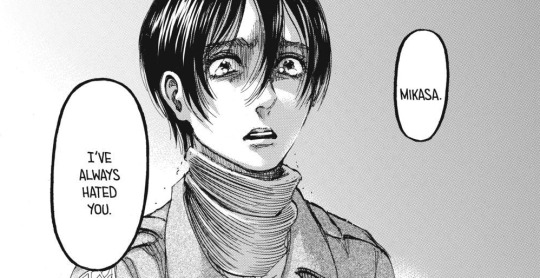
Note that devastated look in her eyes. Wonderful.
And yes, he’s GOT to be lying, because I don’t think Isayama would juxtapose those two scenes so closely together in some unwitting fashion. But he’s doing so much damage to them by now that I honestly don’t even know if it matters?
Take Hange.
She’s the intelligent leader of the team, the one who always has a wild, unlikely plan. She’s a science whiz and comes up with longshot plans that always seem to weirdly… work out.
We’re told that, three years ago, she was presented a plan to overthrow Marley by Zeke - a fucking bastard who is clearly a member of the enemy, he’s lived with them his whole life, as a child he betrayed his parents to them and had them executed for being disloyal to Marley, and he’s killed COUNTLESS comrades of our heroes - and Hange decided Zeke’s plan was the only possible option and came up with no alternatives for four years. So she made them ally up with the least trustworthy person IMAGINABLE for a terrible plan,b because Hange’s… a stupid sucker now, I guess.
And why is it a terrible plan — aside from the fact that there is literally zero reason to ever believe anything Zeke says to you, since he’s the most evil fucker in the world? Oh, because it hinges HEAVILY around forcing another member of the team — Historia — into a pregnancy to churn out a baby they intend to use for the country’s gain.
Historia’s big character arc in “Attack on Titan” has been her coming to terms with her own identity and OWNING it. She’s been hiding under another identity or been controlled by other people much of her life. She finally comes out under her true name, declares that she’ll never leave in fear or be maniuplated ever again, and then—

… oh wait.. she’s manipulated into being barefoot and pregnant against her own wishes, because their greatest enemy asked for it.

There’s a lot to hate about the post-”Return to Shinganshima” Attack on Titan, in short. From characters becoming inversions of themselves to full fanatical Nazis being treated like redemption babies to complete destruction of self-actualization of other characters and the fact that, even if this is part of some larger plan being manipulated by multiple players (which seems likely), it still won’t really make up for much of the damage… and for that matter, how plausible would it even be?
But basically, there’s going to have to be quite an 11th-hour ass-pull to make this turn out decently in my eyes by now. And that’s not IMPOSSIBLE.
But it’s looking pretty unlikely.
#anti-gabi braun#attack on titan negativity#shingeki no kyojin negativity#snk negativity#aot negativity#aot spoilers#snk spoilers#attack on titan#shingeki no kyojin
127 notes
·
View notes
Text
Survey #148
“i am so all-american, i’d sell you suicide.”
Is your signature legible? Yes.
Is smoking an immediate turnoff to you? y e a h
If given the opportunity, would you legally change your name? No.
Have you ever read a book that was over a thousand pages long? Maybe, but I don't think so.
Is your ancestry European? Yes.
Is there a foreign country that appeals to you? Germany and Japan above all.
Do you know the first word you spoke as a child? "Dada."
Do you know anyone whose eyes seem to change color? Mine, actually. Sometimes they look more gray-green than gray-blue.
Do you have a specific talent you’re known for? I guess photography? I mean just about anyone who knows my mom or sister and they show the pictures has complimented it, and my family comes to me for pictures.
What’s your favorite flavor of flavored water, if any? I don’t like flavored water.
Who was the last person you purposely avoided? Hm, don't know.
Do you like blueberries? No, not really. Don't hate them.
Is your backyard big or small? More towards the small side. Proportional to our house, at least.
Are you right or left handed, or ambidexterous? Right-handed.
Have you ever touched an elephant? No, but that'd be amazing.
Are you any good at video games? Yeah, but I'm definitely not as good as when I played all the time.
Are you afraid of being cheated on? In my current relationship, not at all.
Is your face shape oval, heart shaped or square? I'm actually not sure? I have a square jaw, but it's hard to see the real outline of my face bc I am not skinny.
Have you ever been in a play/musical? No.
Have you ever been to an antique car show? No.
Do you have small wrists? Very. Anywhere I've been where they put a band around my wrist, I can just slide it off.
Who has the nicest eyes you know? Some girl whose name I don't remember from junior year band. They were pure sapphire.
Do you have trouble reading small fonts? Not usually.
In terms of writing implements, are you more likely to use a mechanical pencil, ordinary pencil, or a pen? Does it all depend upon what you intend to write with it? Mechanical pencil.
Roughly how hot are the summer temperatures where you reside? 85-100 F.
Do you find watching animals in their natural habitat to be exciting and fascinating? Omfg yes. Wanna be a zoologist for this reason.
When you go shopping, do you tend to go to the left side of the store, the right, or do you aim for a particular aisle right off the bat? Well, I've never done a big shopping venture by myself. Generally I'll only need one thing and go to the aisle.
If you were presented with a bowl of fruit with apples, oranges, bananas, and grapes in it - which fruit would you pick to eat? Grapes or apples.
When was the last time you were so excited/happy that you jumped up and down? Bitch I'm fat we don't do that.
Did you have a good childhood? Yeah.
Do you know anyone who has had a miscarriage? Yes.
What’s your last ex’s opinion of you? We're still friends, but don't talk nearly as much as we did. Dunno if his opinion has changed at all.
List three jobs (other than the ones you’ve already had) that you think you’d really enjoy: Paleontologist, meerkat biologist, zoologist.
If you get into a fight, or think you might, would you throw first punch? Absolutely not.
Do you think more about the past, present, or future? Ehhh present or future, idk.
What’s your brother’s middle name? I actually don't know.
Where do you buy most of your clothes? Hot Topic.
What health conditions do you have? Generalized and social anxiety, AvPD, bipolarity II, chronic depression, OCD, PTSD, I'm beginning to think I never moved on from ADD, chronic heartburn, vertigo, and inactive MRSA. jc I'm falling apart.
Do you wear chokers? YAAAAAAS, that's my go-to kind of necklace.
Favorite Disney princess? Does Mulan count?
What would you say your favorite day in history is, or a day you find interesting? If you could, would you travel back in time to experience or witness it? Hm, can't say I'm sure.
What’s the most embarrassing thing you’ve ever had an obsession with? Do you still like that thing? Anything I've ever been actually obsessed with is embarrassing lmao.
In your dreams, do you mostly see things through your own eyes, or do you see yourself through a third person view? Third person.
Do you have a Vine account? Who are your favorite Vine users that you follow? No. My favorite Viner is Thomas Sanders.
Have you ever had an eating disorder? No.
Ever had a fishtank in your room? No.
How many jobs have you had? Two.
Were you a chubby child? No.
Did you ever have senior photos done? No.
How old are your parents? Mom's 57, Dad's 56.
Favorite candy? Reese's, Milky Ways, sour punch straws, uhhhh p much anything else sour.
Are you saving yourself for marriage? I don't really know, but regardless, it's unlikely I'll ever have to actually actively make that decision since I'm 99.99% chance marrying a girl and I'm a girl so.
Would you rather have long or short hair? Short.
What is your favorite kind of fruit? Strawberries and kiwi.
Do you own any shirts with a peace symbol on it? No, but I'd like one.
Ever had ice cream dots? Yes.
Do you have your national flag hanging up anywhere outside your house? No.
When is the next time you’ll be up on stage? *shrugs*
Were you ever a boy or girl scout? Yes.
Do you like coloring books? I was obsessed as a kid, and I can still enjoy them if I have nothing else to do.
Have you ever been cheated on? No.
What is the newest hobby you've started? This is so weird. I haven't like... seriously started acting on it, but I'm getting into makeup??? And wanna teach myself how to do it well????
Your first crush: name, hair color, and where did you meet them? Dylan, brown, and elementary school.
Are you happy with the gender you were born with? Yes.
What do you think you are MOST talented at? Writing, probs.
What do you want to be for Halloween this year? I'm feelin' something steampunk.
What is your favorite way to express your creativity? Writing.
Seashell hunting or stargazing? The former.
Were your ancestors rich or poor? Idk. Preeeetty sure Queen Victoria wasn't, but I don't know like my whole ancestry.
Do you know who you want to be the bridesmaids in your wedding? Mom's going to be my maid of honor, then I know Colleen, Ashley, Nicole, and Chelsea will be 'maids. I don't know about others, really. There's a few online friends that I'd love to come to be some, but I doubt it'd actually happen.
What natural disasters have you experienced? Hurricanes.
If you were to re-decorate your room and had to choose a theme, what theme would you choose? Gothic.
What is the current theme of your bedroom, if you have one? Don't have one.
Were you popular in high school? No.
What’s the most creepy experience you’ve ever had? A paranormal experience while home alone.
What’s the most boring game to exist? Why do you dislike it so much? Idk.
Do you believe everything happens for a reason? No.
What’s your father’s middle name? John.
What holiday is your birthday closest to? Valentine's Day.
How many states have you lived in? One.
What do you usually order from Olive Garden? Spicy shrimp fritas literally every time fuck me UP.
Have you ever ridden in a limo? No.
5 notes
·
View notes
Text
Disciplining the Mind – North Korean style

Sun Myung Moon was in North Korea from 1946-1950.
Ron Paquette spoke to one of Moon’s sons about indoctrination: “And I said in many ways it reminds me sometimes of the communist camps, and at that point he said: ‘Yeah I know,’ he said, ‘and Father learned that when he was in prison camp,’ and I kept trying to make the point that no, no, the way we bring in people, and the way we control people is kind of like the way this goes on in North Korean prison camps, and he kept saying ‘I know.’”
from “Reverend Sun Myung Moon: Emperor of the Universe”
TV special (Ron Paquette speaks at 23 minutes)
Review: “When the history of North Korea is discussed, the focus is usually on the division of the peninsula, the installation of a pro-Soviet regime, and the application of communism. But Charles K. Armstrong went far beyond this approach in this work.
Armstrong went through several aspects of North Korean society, touching upon even art, to show how the government’s authority and ideology touched upon every aspect of daily life and every imaginable segment of society. To his credit, he highlights the communists’ significant overturning of traditional Korean classes, as the communists placed the peasantry on top.
A sound work free of political bias which examines what the North Koreans did between August 14, 1945 and June 25, 1950, in their attempt to revolutionize their half of the peninsula.”
The North Korean Revolution, 1945–1950
By Charles K. Armstrong
Series: Studies of the Weatherhead East Asian Institute, Columbia University
Paperback: 288 pages
Publisher: Cornell University Press; 1 edition (February 19, 2004)
ISBN-13: 978-0801489143
North Korea, despite a shattered economy and a populace suffering from widespread hunger, has outlived repeated forecasts of its imminent demise. Charles K. Armstrong contends that a major source of North Korea’s strength and resiliency, as well as of its flaws and shortcomings, lies in the poorly understood origins of its system of government. He examines the genesis of the Democratic People’s Republic of Korea (DPRK) both as an important yet rarely studied example of a communist state and as part of modern Korean history.
North Korea is one of the last redoubts of “unreformed” Marxism-Leninism in the world. Yet it is not a Soviet satellite in the East European manner, nor is its government the result of a local revolution, as in Cuba and Vietnam. Instead, the DPRK represents a unique “indigenization” of Soviet Stalinism, Armstrong finds. The system that formed under the umbrella of the Soviet occupation quickly developed into a nationalist regime as programs initiated from above merged with distinctive local conditions. Armstrong’s account is based on long-classified documents captured by U.S. forces during the Korean War. This enormous archive of over 1.6 million pages provides unprecedented insight into the making of the Pyongyang regime and fuels the author’s argument that the North Korean state is likely to remain viable for some years to come.
pages 210-214
Disciplining the Mind
In the North Korean surveillance regime, social discipline was ideally not something to be imposed by outside regulation and coercion. Discipline was to be internalized through self-examination and reform at the individual level, and “thought struggle“ leading to “thought unification“ at the collective level, North Korean communism shared with its counterparts in China and Vietnam, as well as (with a different ideological content) prewar militarist Japan, a strong emphasis on drawing the wayward individual into political conformity through reeducation and reform rather than physical coercion and punishment. The most dramatic example of this was the public ritual of “‘self-criticism” (cha-a pi’p’an or chagi pip’an).
Originally a Soviet technique, self-criticism was used to a much greater degree by the North Koreans and Chinese, and became well-known in the West during the Korean War as part of communist “brainwashing.” It may be that in cultures deeply influenced by neo-Confucian notions of the innate goodness and spiritual malleability of human beings, all deviants are in theory capable of being reformed through self-reflection and reeducation. Self-criticism was the public expression of this reform, through which the genuinely repentant individual could be reintegrated into the community. Its quasi-religious nature has often been noted, although the public nature of self-criticism is much more like evangelical Protestant “testimony” than Catholic confession.
What the Korean communists called “thought unity“ (sasang t’ongi’l), or what the American observers in their characteristic fashion called “totally conditioned public opinion,” was a theme the state and every social organization in North Korea constantly stressed. This stress on ideological conformity derived not only from Soviet influences, but also was clearly resonant with the relentless “thought policing” of the late colonial period, albeit with a very different political content. The North Korean regime put enormous resources into propaganda, as we have seen in the previous chapter, both to encourage support for the regime as well as to uproot subversive ideas that might aid the Americans and the South Korea agents who were suspected behind every corner. Thought had to be free of all reactionary taint and politically pure. The undisciplined mind was a thing to be feared.
Disciplining the Body
One final object of discipline stressed in the North Korean literature was the human body. Immediately Following the creation of the DPRK, there was a considerable emphasis on hygiene, sports, and physical purity. The individual had a duty to perfect his physical condition in order to strengthen the society and better serve the state. In particular, there was an emphasis on large, coordinated group sporting events, the precursors of the “mass games” that would in later years be a hallmark of North Korean entertainment for visiting foreign delegations. In North Korea of the 1940s, images abounded of parades of young athletes carrying flags, group calisthenics, and public drills celebrating holidays and events of all kinds. This too had a resonance not only with the Soviet Union and other communist societies, but also prewar Japan and, further afield, the mass-mobilizing states of Fascist Italy and Nazi Germany.
The extent to which society was portrayed as an organic unit to which the individual contributed his entire physical and spiritual being, in which “all hearts beat as one” (to use a later North Korean phrase) was probably closest to Imperial Japan. But, as John Dower has pointed out, the Japanese government chose to portray such a rigid image of national unity precisely because many feared that the masses did not share in the virtues the state espoused. The state seemed to be attempting to create a sense of unity and political cohesion in part through the active involvement of the individual in public, physical displays of bodily conformity. These would not be the “docile bodies” that Foucault refers to, but “active bodies” moving in choreographed unity, sports reflecting the indivisible purpose of the nation in all areas of politics, economics, and culture.
The well-trained individual body was a synecdoche of, and a prerequisite for, a well-functioning body politic. Both had to be disciplined, strong, and determined. The inaugural issue of Inmin ch’eyuk (People’s Physical Education) in February 1949 proclaimed that physical training “will help realize complete national unification and democratic development.” Physical education was the “firm foundation” of the people’s economic development and the defense of the Fatherland. Although there were already more than 60,000 members of 11,208 athletic groups in the North, there was still a need to “permeate physical education more broadly among the people,” to replace the antiquated Japanese physical education system, and to educate all people in the workplace, farm, and school to become good comrades. Everywhere the nation was supposed to walk in step, both literally and figuratively.
Internalizing Security
After the creation of the Democratic People’s Republic in 1948, the North Korean documents show an increasing concern with external dangers to the nation and social discipline appears increasingly militarized. Although references to “reactionary elements” and “national traitors” within North Korea diminishes, criticism of reaction and national betrayal is increasingly focused on South Korea and talk of “defending the Fatherland” ( chogukk powi ) escalates. At the same time, there is a move away from the negative elimination of “bad elements” to the positive creation of “thought unity” within the party and local People’s Committees and the spiritual and physical training of individuals, all linked in turn to the defense of and integration into the state that represents the “national subject,” the Democratic People’s Republic of Korea. There is, in short, an unbroken continuum from the internal discipline of the individual to the external defense of the nation.
Local counties and villages were linked to the national security/military complex through the Self-Defense Units ( chawidae ), supervised by the Procurator’s Office, which was in turn part of the Ministry of Internal Affairs. Self-policing institutions were a common feature of traditional Korean villages, but it was the Japanese colonial authorities who first linked these organizations effectively to the centralized police forces and the state.86 The North Korean state also drew on this system of local self-defense, but the social hierarchy was reversed: rather than being headed by the village elders, held in respect due to their age and perhaps a modicum of Confucian education, the local Self-Defense Units were run by local peasants who were generally both poor and young. In the village of Tongmyon in South P’yong’an, for example, most of the twenty Self-Defense Unit members employed in the local police substation were in their early thirties, all were poor peasants, and two were women.87
The responsibilities of the Self-Defense Units were broad, including the dissemination of state policy (including foreign policy), protection against “infiltration of reactionary elements,” and security from fire and theft.88 At the first meeting of the Tongmyon Self-Defense Unit in October 1949, the members promised to “work for the benefit and productivity of the local people,” to “expose and smash reactionaries and puppets and their helpers,” and above all to “overcome all difficulties and discipline ( hullyonhada )” themselves “for obedience to the demands of the state.”89
86. Likewise, the Japanese in Taiwan made effective use of the traditional Chinese baojia neighbohood family system of local security. See Chen, “Police and Community Control Systems,” 226.
87. RG 242, SA 2005, 4/36. “Personal History of Each Village Guard,” Tongmyon Police Sub-Station, 1949 (“top secret”)
88. RG 242, SA 2009, 8/58. Poster on responsibility and mission of Self-Defense Units, belonging to Cell Section, Kangwon Provincial Public Procurator’s Office, 4 November 1947.
89. RG 242, SA 2005, 4/36. “Record of the First Meeting of the Self-Defense Unit,” Tongmyon Police Sub-Station, 12 October 1949.
90. RG 242 contains a “handbook” on self-criticism, a translation of a 1927 Soviet document, which states that “self-criticism [ chagi pip’an ] is a method of promoting revolutionary consciousness of party members, cadres, and ordinary working-class.” RG 242, SA 2009. 7/32. Propaganda Section Chinnamp’o Korean Communist Party Committee, May 1946. Party members also circulated translations of Chinese articles on “Thought Guidance” by Mao, Liu Shaoqi, Zhu De, and others, indicating the mix of both Soviet and Chinese influences in postliberation North Korea. See RG 242, SA 2009, 6/73.
91. Prewar Japanese tenko (conversion) of “thought criminals” used techniques quite similar to later North Korean and Chinese “reeducation” See Mitchell, Thought Control, 127-47. As mentioned earlier, many Korean communists had themselves been objects of tenko campaigns during the colonial period.
92. For a brief description of self-criticisim in North Korea see Schramm and Riley, “Communication in the Sovietized State.” 764.
93. State Department, North Korea, 91.
94. John W. Dower, War without Mercy: Race and Power in the Pacific War (New York: Pantheon, 1986), 31. For an interpretation of North Korea as a “corporatist” organic state, see Bruce Cummings, “Corporatism in North Korea,” Journal of Korean Studies 3 (1983): 269-94.
95. Foucault, Discipline and Punish, trans. Alan Sheridan (New York: Vintage, 1979), 135-169.
96. RG 242, SA 2008, 10/122 Inmin Ch’eyuk 1, no. 1 (February 1949): 1.
Moon: “… you must know the knack of holding and possessing the listeners’ hearts. If there appears a crack in the man’s personality, you wedge in a chisel, and split the person apart.”
United States Congressional investigation of Moon’s organization
Politics and religion interwoven
The Resurrection of Rev Moon
0 notes
Text
Trip to the Collingwood & Co Studio
On Thursday I arrived per invitation to Tony’s studio in Acton-Town to attend a meeting about TSS with Glynn Hayward and Helen Shroud. Andrea Tran also popped in later on and we all had a wonderful chat together.
I was there for 4 hours (for what was supposed to be a 1 hour meeting), with Helen and Tony regaling me with tales of inside info and what-could-have-beens. I was allowed - even encouraged - to record the whole “interview”, but it turns out that the phone I was using didn’t actually save it (A real “Secret Spider” moment for sure). Everyone was absolutely charming, and apart from the recording flub it was a lovely day that couldn’t’ve gone better.
Highlights include, to the best of my recollection:
• If the website is to return it might have to be heavily re-structured to cope with Flash essentially being a dead platform at this point.
• Roy was voiced by Tony’s son Harry
• The Commander in Secret Spider is called Vin, and the female actor from World Savers is Jilly
• Ray’s name is Raymondo not Ray Mondo - and it’s Zebulons not Zurbulons.
• VANITOR IS CANON AND HAS ALWAYS BEEN CANON
• CD “drinks too much” - the lines “I’ll stay here and hold the port” and “12%? That’s all the proof I need!” are references to this, in addition to his wine-bottle wrapping in Secret Santa and his favourite food in one of the books being Madeira cake, the main ingredient of which is wine.
• Victor’s lesser-noticed catchphrase of “Aw, c’mon..!” is inspired by the fact that Alan Marriott actually says it quite a lot in real life.
• Masters were located for 2 full 1/2-hour Nicktoons broadcasts, completely uncompressed, and there are likely more - although we still don’t know exactly how many were modified.

• Masters for 4 previously-unknown shorts were discovered, with the theme of “What’s The Deal With _____?” - Helen was greatly surprised they weren’t on the DVDs as the Profile shorts had taken their place. (can’t find the photo of the master as we only found it towards the end of the day but I have a pic of Helen’s copy)

• An unused villain was going to be The Puddle Heads, sworn nemesis's of The Floaty Heads - he couldn’t find the concept art for them so he drew one in front of me to keep! I shouldn’t say much about them except that you might be seeing them sooner than you think...
• There were initially plans for each 4-digit code in the episode to each unlock something different individually on the website - this was never implemented as they never made enough goodies to cover 52 different codes.
• Helen used to have a copy of the show’s entire soundtrack on her iPod until it broke.
• Tony knows about the DeviantArt fanfics. To hear him actually say the site’s name out loud was a very surreal moment indeed.
• The disclaimer that the Bogie Ball blooper was “deemed Too Gross for national television” is actually true - everything except the end of that scene was actually going to be in the original episode but the BBC said it was too much.
• There’s a 4th BTS called “The Music Of the Secret Show”, which would’ve been with Roger Jackson - we found the master for the 3rd one (“The Sounds Of The Secret Show”) but not the 4th.
• There were also 4 PP Lectures made, which means there are two of those that have never been released either.
• The Space Wasps (from What’s In The Box and Planet PP) have a different origin in both simply because they needed to reuse the assets.
• Tony had the entire plot to the potential Series 3 opener all planned out, and gleefully recounted the first half of it to me in great detail. I’ll keep the specifics mum for the time being just in case it ever ends up happening after all - but I’ll say that it would’ve been amazing. Also Tony totally should’ve been a VA, his voices were great.
• Everyone was fascinated by the number of international dubs I’d managed to collect, and when I showed them the Latino-Mexican intro there was much groaning and laugher all ‘round. Speaking of which, we discovered a sampler-disc of the Catalan dub that even Tony was surprised they had:

• The reason why it’s never revealed what CD won his medal on the Mantlepiece for is because nobody could think of anything funny enough to warrant revealing.
• Unbeknownst to anyone, the physical masters for episodes 7 and 28 were AWOL from their designated boxes and remain unaccounted for, although they are still stored digitally - I know this because I re-sorted their entire TSS disc-archive for them while I was there. Andrea was happy for the heads-up and Helen gladly suggested I make a note of it on the box.
• Martin Hyder was hired almost by accident - he was called in just to record the Temp Track for Stephen Fry’s lines in the pilot as Fry had to record them separately. Someone asked Martin to fill in a line for Ray, and he suited the role so well that they casted him on the spot.
• The One Breath Lady was both voiced by and inspired by one of the writers, Jimmy Hibbert. Tony recounted that Jim had a habit of speaking in run-on sentences for so long that your eyes would be watering on his behalf, willing him to actually inhale some air and take a goddamned breath once in a while.
• There was an event known as “Spy Day” in which a whole bunch of children were brought together to do TSS-themed spy activities. There are two separate recordings of this.
• Tony knew that Nicktoons had once broadcast The Martian Dub (Sep 20th ‘08) but Helen was unaware. Her reaction to finding out was amazing.
• Anita’s parents were never given a backstory simply because they were never relevant to the plot - Anita’s aquatic origins shall remain a mystery....
• Glynn and I both agreed that due to internet speeds and technology advancing a truly substantial way since 2006, remastering the site’s audio from 22050Hz to 44100Hz is completely feasible, and that I could even help resample it. Tony and Helen admitted they’d lost us completely during our nerd-out which we all had a good laugh over.
• Tony asked completely of his own volition if I knew of TheSecretShow4You, which is of course our friend and empress, the Vanitor Queen. He greatly admires how much she has come up with over the years and says he loved the 10th Anniversary video.
• Helen was very surprised to learn that the first 24 episodes had reaired all throughout last April this year in Germany - presumably Disney Germany renewed their licence. Speaking of which:

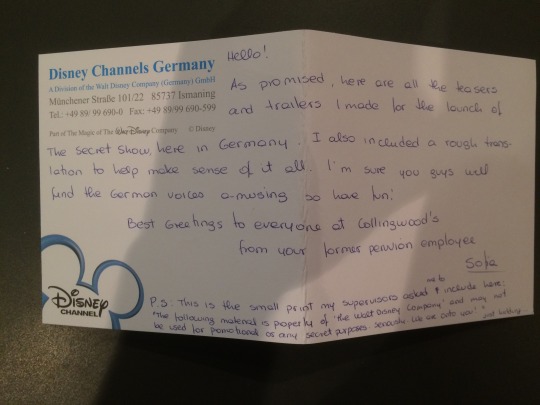
• The Spider was supposed to appear in Secret Sleep - about 6 minutes in, crawling on the front edge of the bed just before PP falls asleep. Neither DVD nor Broadcast version has this due to a rendering error, although they didn’t actually believe me at the time:
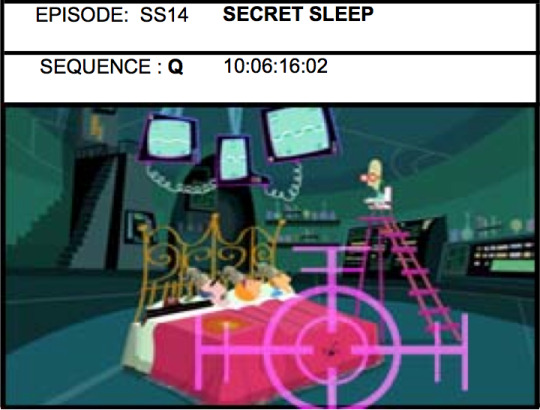

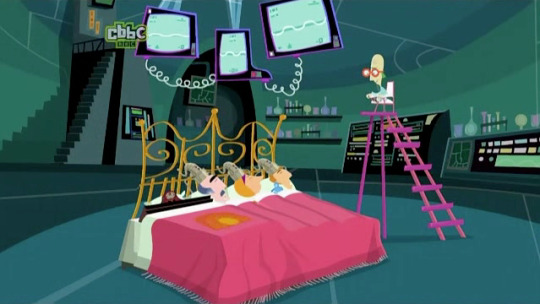
The top photo is from “The Book Of Revelations” - a pair of .pdfs that track every single hidden thing from every episode along with a few other things. They are now in the Google Drive folder under “Books” for your viewing pleasure.
• I gave Tony my still-shrink-wrapped copy of the Italian Vol4 DVD as a gift for basically putting up with my wall-of-text emails over the last three years. In return I was presented with a take-home copy of the 2004 Pilot version of Lucky Leo as Tony still had a few copies left. It is now in the Drive under “Rare Broadcasts” - you will notice more than a few differences to the final version, I’m sure:

• There was an entire marketing pack produced of which only two exist. Photos of literally everything from it are in the “Studio Visit 02/11/17″ folder, along with all the master discs that we found in the cupboard.

• Two Betamax masters were found as well - I don’t know about you but I thought that was absolutely amazing:

The second tape contains an 11-minute Interview with Tony about the show which has never been shown outside the industry.
• A prototype of the UK version of Vol2 was also discovered, along with two different prototypes of Vol1 - Sadly none were found of 3 or 4 as BBC WW were actually the ones who pressed them, Col & Co simply handing the files over to them to compile.

And last but certainly not least:
• This morning, the day after the meeting, Glynn emailed me several files from his archive of the website which were previously lost - the U.Z.Z./T.H.E.M. Doorhangers, the CD Cutout, The Spiderbikes game (literally called spaceinvaders.swf) and the rarest of all, the 2007 Easter Exclusive Site Map - available now at your local Website Downloads folder. He also kindly sent some original concept art for the games that he’d drawn himself back in the day, including one that never made the cut, of which I will make another post about separately. (if you want a sneaky peek, look in the Cocept Art & BTS folder...!)
One final thing, for now at least - While I was there Helen and Tony deigned to show me the trailer for their newest series, “Thorgar” - I was “the first person under 30 to see it” and I can tell you now it’s absolutely amazing. Seriously, as soon as it starts airing you guys need to watch it immediately, it’s spectacular.
#The Secret Show#Innumerable Goodies#Original Masters#Tony Collingwood#Helen Stroud#Andrea Tran#Glynn Hayward#These People Are Some Of The Greatest Humans Currently Alive#Also I'm not joking Thorgar is great#the secret show website#Downloadables#It was the best day ever charlie brown#MK's finest hour(s)
23 notes
·
View notes
Text
Who's Who in the Shimada-McCree Family
A/N: This is the family for my McHanzo domestic AU, I’m writing it along with a lot of other things. Please ask about the fam. They’re precious.
Hanzo:
The “strict” father.
Goes to all of his kids’ extra curricular activities.
Wakes the kids up for school.
“Yes, Weston. You need to go to school today.”
Is a big softie for Hatsu and Eiji.
Does most of the cooking.
Always worries about the kids when he’s away on missions.
Gives the older kids life advice.
Has all of their awards and certificates in a trophy case or hanging on the wall.
Lowkey brags about his kids.
Loves when his kids ask if they can meditate with him.
Makes the whole family go on yearly trips to Hanamura.
Loves taking the kids on camping trips.
He’s usually the only one actually getting the items on the grocery list.
“No, Jesse. We don’t need… denim scented candles?”
“Weston don’t climb that!!”
“Ana, Dominic. Where’s Eiji and Hatsu?”
Forces Jesse to come to all of the parent-teacher conferences.
Isn’t mad, just disappointed.
Encourages his kids to achieve their dreams.
Has to defuse any and all fights between Dominic and Ana.
Hates when the kids fight with each other.
Jesse:
Let’s his kids get away with just about everything.
Sneaks them candy before dinner.
And after.
Let’s them stay up late.
Even on school nights.
Makes breakfast while Hanzo wakes the kids.
Also makes their lunches.
Bakes a ton of sweets for the school bake sale.
Likes to flirt with the moms on the PTA to mess with Hanzo.
Hates going to parent-teacher conferences.
Probably tried to bribe the teachers to pass his kids at least once.
Isn’t disappointed, just mad.
When he’s away on a mission he calls the house every chance he gets.
“You kiddos okay?”
“Yes, dad. Same as when you called ten minutes ago.”
Best cuddles when it’s cold in the house.
Likes it when the whole family is snuggled up on the couch.
Always let’s any of the kids sleep in bed with him and Hanzo if they can’t get to sleep.
Gets everyone in the family hats and serapes matching his.
Along with the kids, begs Hanzo to let them get a pet.
Teaches the kids how to shoot a gun.
Always takes them to visit Reinpa and Grandma Amari and Grandpa Gabe.
Isn’t allowed to be alone with the younger kids for more than a few hours.
Reinhardt:
The fun grandparent.
“Reinpa” because his name was too hard to pronounce for the little ones.
Teaches Ana, Dominic, and Weston how to speak German.
Loves taking them to visit Germany.
Always bringing them stuff back from his travels.
Is a big teddy bear.
Always has at least one grandchild with him while he’s visiting.
Picks up the kids and puts them on his shoulders.
Let’s them climb him.
“Rein, be careful hE MIGHT FALL”
But seriously, will dote on his grandkids cause he’s a concerned Reinpa.
Highkey brags about them to anyone he meets.
Has pictures of them in his wallet.
Brings them sweets from Germany.
Ana Amari:
She’s the best at getting the kids to behave.
Is always able to get them to bed.
She secretly sleep darts them.
Loves taking Ana and Dominic to Egypt.
Teaches them Arabic if they want.
Cried when she heard her oldest granddaughter was being named Ana.
Loves being with the youngest ones.
Somehow manages to know when one or more of the kids is sick???
Makes the best tea and chicken noodle soup.
Is the go-to babysitter though.
Will drop everything to be with her grandkids.
Goes to every event for the kids.
Lowkey wants to take them home with her.
Teaches Dominic and Ana how to use a sniper rifle.
Goes to all of Dominic’s concerts.
Supports her grandkids.
Is the best grandma.
Genji:
Let’s Hatsu and Eiji play with his dragon.
Speaks to them in Japanese so they know their native tongue better.
Let’s Weston use his sword.
Gets in trouble for letting his nephew use his sword.
Insists he doesn’t have a favorite.
He does.
It’s Weston.
Loves to make them his favorite Japanese meals.
Loves to babysit his nieces and nephews.
Encourages Dominic to choose his own path.
Literally encourages him to rebel against Hanzo.
Is Hatsu and Eiji’s nightlight though.
But the kids refuse to hug him in the winter because he’s so cold.
Except for Hatsu.
She loves cold.
Highkey tried to take one of them home with him one time.
Hanzo and Jesse noticed two hours later that Weston was missing.
He takes them to the arcades all the time though.
Is the best as claw machines.
Wins Hatsu and Eiji whatever they want.
Tried to give Dominic Sake once.
If he heard Dominic or Ana has a date, lowkey follows them.
They still know he was following them.
Is jealous when one of the kids says Hanzo’s cooking is better.
Mercy:
Has known just about all of the kids since birth.
Was the pediatrician for all of them.
Still is for Hatsu and Eiji.
Literally is always doting over Weston.
Calls the house every week to see how Weston’s genetic therapy is going.
Makes sure all of the kids are eating healthy.
Has and will call one of the older kids out on their shit if they make her mad enough.
Is usually fairly patient though.
Gives extremely good advice.
Always gives them Swiss chocolate.
Helps Ana through her female problems since her house is full of males and the only other female is Hatsu who is five.
Sometimes stays the night if Weston is having a problem with his dyslexia and can’t do his homework.
Helps Weston through his low points about himself.
She’s always there to give words of encouragement.
Answers any questions they may have about medicine or treatments if they are sick.
Will stay at the house the entire time one of the kids is sick if she feels she needs to.
“Angela, you don’t need to-”
“Jesse, I am staying. Eiji has the flu, he needs me.”
Loves to take Hatsu and Eiji to the park.
If Ana or Dominic is mad at the other or their parents she lets them stay with her.
Is like the mom for the kids.
But she’s their aunt.
Soldier 76:
“Grumpa”
Forgets their names half of the time
If he’s babysitting he’s either doing paperwork or sleeping.
Sometimes both.
Calls Weston “Mini McCree”
Fell asleep on the couch once.
He slept on the remote.
Gets Dominic and Weston confused sometimes.
Insists he’s the best grandfather though.
Lost Hatsu and Eiji at the mall once.
Everything is a challenge though.
Don’t let him get Christmas gifts.
He either wraps them in newspaper or doesn’t wrap them at all.
Lowkey loves his grandkids and brags about them to everyone.
Doesn’t let Gabriel or Jesse or Hanzo know he really does love the kids.
They do know.
Reaper:
Honestly, the best grandfather ever.
Takes his grandkids to the best restaurants.
Always insists he stay the night.
If he’s babysitting over night and Hatsu or Eiji wakes up from a nightmare he hums or sings to them.
Has conversations with Dominic in Spanish.
Loves to help the kids prank Jesse and Hanzo.
Took Eiji home with him once.
It was the best two hours of Eiji’s life.
He always manages to bring some kind of stuffed animal for Hatsu and Eiji.
He spoils his grandkids to death.
He bought them too many Christmas presents at one point.
He was put on a budget.
He could spend $300 on each kid.
He bought 600 stuffed animals from the dollar store, 300 for Eiji and 300 for Hatsu.
Makes all of the Halloween costumes for the kids.
Made matching costumes for everyone.
They were a Mariachi Band.
Always talks about how he’s the better cook.
Hanzo disagrees.
But Gabe makes all the traditional Mexican food for his grandkids.
Loves listening to Dominic’s music.
Sneaks so much candy to them.
They aren’t hungry by the time it’s dinner.
Loves to cuddle Hatsu and Eiji.
They’re always attached to his legs.
Gets the kids ice cream if they’re upset.
Has tons of pictures of his grandkids.
Shows everyone.
No matter where he’s at.
Ana Gabrielle:
The oldest kid.
Loves her siblings.
Sometimes not Dominic.
Loves her grandparents.
All of them.
You know how a lot of girls wanted to marry their fathers when they were young?
Ana wanted to marry her Aunt Mercy.
Lowkey loves rock music.
Highkey is obsessed with classical and instrumental music.
Loves animals.
Tried to bring a sloth home from the zoo.
Is secretly good at singing.
Meditates with Hanzo on a daily basis.
Honestly, has punched Dominic more than once.
Their fights get physical sometimes.
Ana is a badass though.
She secretly misses her mom.
Curses in Japanese when she’s frustrated.
Plays the piano and the drums.
Highkey loves spicy everything.
Is the best baker in the house, second to Jesse.
Halloween is her favorite holiday.
Insists she buys all of the Christmas presents by herself.
Makes Christmas dinner with Hanzo and Grandma Amari every year.
Stays up at night helping Weston with his homework.
Sleeps like four hours a night.
Help her.
But the biggest nerd ever.
Dominic:
Really sweet.
A hard ass.
But sweet.
Is closer to his Grandpa Gabe than anyone else.
Tells him everything.
Writes Spanish songs and plays them for his Grandpa Gabe.
Loves his Grandma’s tea.
Cranky if he doesn’t listen to music at least once a day.
Hates country music.
Obsessed with pens.
Has hundreds.
Prefers erasable ones.
Plays so many instruments.
RIP Hanzo and Jesse’s bank accounts.
Dyed his hair blue and green once.
Hanzo fainted.
Dominic regretted it.
Picture day was a week later.
Most Christmas spirit out of the whole family.
Sings Christmas songs every year.
Is the first person to wake up.
Buys the best Christmas presents.
Wants to be a musician.
Wants his own car.
Can barely afford his guitars.
Ditched school for his gigs.
Loves the rain.
Has run outside during a storm.
He got sick.
Loves to read books.
Fantasy specifically.
Weston:
Protect him.
Just wants to be happy.
Is really insecure about himself.
Loves his uncle Genji.
Steals Jesse’s hat a lot.
Likes to use his gun.
Eats fried chicken as a midnight snack.
Talks in his sleep a lot.
Shares a room with Dominic???
He likes to stay with his dads though.
Brags to Hanzo and his Uncle Genji that he has three dragons.
Thinks it’s funny to unleash them in school.
Loves playing video games.
Watches old west movies with Jesse a lot.
Likes to be called “Wild Weston”.
Hates the water.
Hates his dyslexia.
He loves his family a lot.
Loves being with his Grandma Amari and Grandfathers.
Doesn’t like it when his sister and brother fight.
Has fought a few kids at school though.
Sneaks cookies and brownies to school.
Eats ice cream for breakfast when his Grandpa Gabe is in charge.
Has a small crush on his aunt Fareeha.
Hatsu and Eiji:
Twins.
Hatsu is more outgoing then her brother.
They’re the babies of the family.
Get away with everything.
Love sugar.
Are very attached to their stuffed animals.
Practically share a room with their dads.
Eiji loves vanilla ice cream but Hatsu loves mint chocolate chip.
They hate pancakes but love waffles.
Christmas is their favorite holiday.
But they’re always the last ones awake.
Love school.
Have a lot of friends.
Loves to be with their Grandma Amari or their Grandpa Gabe.
Hatsu’s favorite color is blue while Eiji’s is orange.
Can’t sleep without a nightlight.
Love TV.
But they don’t watch it often.
Get tired really easily.
Hatsu is Hanzo’s favorite and Eiji is Jesse’s.
Are very creative.
Really energetic too.
Surprisingly love vegetables.
#jesse mccree#hanzo shimada#mchanzo#domestic au#domestic overwatch#domestic mchanzo#genji shimada#soldier 76#jack morrison#ana amari#reinhardt wilhelm#reaper#gabriel reyes#mercy#angela ziegler#overwatch oc#overwatch ocs#overwatch au#Overwatch#domesticwatch
225 notes
·
View notes